Statements: Voices Shaping Sudan’s Narrative
“The Tarsin Landslide Disaster in Jebel Marra: Between Nature and Forgotten History”
By: Saif Eldin Adam Ahmed (David)
Sudan Sawa Sawa, September 5th, 2025
A devastating natural disaster struck the village of Tarsin, located in the administrative area of Dar Oumwa – Shartawiya Ibrahim Suleiman Hasballah, west of the Soni area and near the villages of Doling Rowa, Turko, and Rang Rowa, with Loqi lying to the west. A massive landslide buried the entire village under debris, while flash floods from the surrounding highlands swept many residents far from their homes, leaving behind a trail of destruction and casualties across the mountainous terrain.
Tarsin lies within the Jebel Marra range, a geologically volatile region characterized by volcanic formations that make it particularly prone to landslides and erosion during the heavy rainy seasons. This harsh natural environment is further exacerbated by fragile infrastructure and a lack of essential services, such as factors that amplify the scale of disaster whenever nature strikes.
Dear readers, allow me to take you back through the shadows of war and humanitarian crises that have long haunted this region. The current tragedy unfolds against a backdrop of deep historical suffering. Jebel Marra has long been a fertile ground for armed resistance. It became the birthplace of the Sudan Liberation Army in 2002. In 2016, the area faced direct assault by the former National Congress Party regime, which launched airstrikes and chemical weapons attacks, causing significant human and environmental damage.
Throughout its history, Jebel Marra has suffered from marginalization and neglect, both during the colonial period and under successive national governments. The region has remained cut off from basic infrastructure, lacking roads, healthcare, education, and other critical services.
The scale of the current disaster can not be understood as merely a natural event. What happened in Tarsin is the result of a deadly combination of natural and human factors, volcanic terrain and steep slopes, compounded by a complete absence of infrastructure, disaster preparedness, and emergency response. Decades of armed conflict have left the region isolated, exhausted, and vulnerable.
This grim reality demands a comprehensive response that addresses both the immediate and long-term needs of the affected communities. The following steps are urgently required:
1/ Immediate humanitarian intervention to rescue survivors and provide food, shelter, and medical assistance.
2/ Environmental risk reassessment of the Jebel Marra region, along with the development of proactive disaster-preparedness plans.
3/ Political and historical accountability for the long-standing marginalization that has left the people of Jebel Marra among the most vulnerable in Sudan.
Dear readers, the tragedy in Tarsin is a stark reminder of how natural disasters collide with political and historical neglect. It is a sobering call to action: the people of Jebel Marra are trapped between the jaws of natural catastrophe and the legacies of war. Their survival depends not only on emergency aid but on a broader vision—one that recognizes their history, addresses past injustices, and reclaims dignity for this forgotten region.
“Sudan Between Wealth and Revolutions: A History of Colonial Greed and Ongoing Conflicts”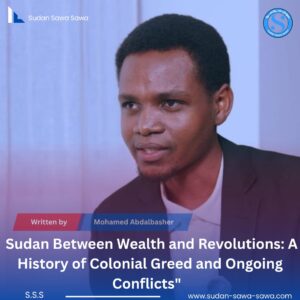
By Mohamed Abdalbasher
Sudan Sawa Sawa, June 30, 2025
Sudan, the vast country at the heart of Africa, has long been a focal point for colonial ambitions—not only because of its sensitive geopolitical location but also due to its rich natural resources and diverse cultures. However, these advantages have been undermined by repeated failures in political governance. Since gaining independence in 1956, Sudan has rarely experienced prolonged stability, instead remaining trapped in a cycle of revolutions, coups, civil wars, and persistent political and economic crises—all rooted in the mismanagement of its cultural diversity.
Strategic Location and Wealth: A Persistent Target of Colonial Ambitions:
Sudan is strategically located between the Horn of Africa and North Africa, sharing borders with seven countries and possessing a vital seaport on the Red Sea. This location has made it a constant target for regional and international competition. In addition, Sudan is among Africa’s richest countries in terms of natural resources, with vast reserves of gold, oil, minerals, fertile agricultural land, and access to the Nile River. These assets have historically attracted colonial powers—most notably the British and Egyptians during the Anglo-Egyptian condominium (1899–1956)—and have continued to make Sudan a battleground for regional and international influence.
Revolutions as Tools for Change… But Without Lasting Stability:
Since its independence, Sudan has witnessed several popular uprisings that toppled military or authoritarian regimes. The most prominent of these include:
The October 1964 Revolution against the first military regime. The April 1985 Uprising against the rule of Jaafar Nimeiri. The December 2018 Revolution ended Omar al-Bashir’s 30-year rule. However, despite these revolutionary milestones, Sudan has failed to establish a stable and lasting democratic system. More often than not, these uprisings were either thwarted by military coups or collapsed due to fragile political alliances unable to withstand deep-rooted structural challenges.
Civil Wars: The Legacy of Political Regimes in Sudan:
One of the most defining features of modern Sudanese history is its internal conflicts and civil wars, including:
The North-South Civil War (1955–1972, then again from 1983–2005), which ultimately led to the secession of South Sudan in 2011. The Darfur crisis, which began in 2003 and continues to have lasting repercussions despite temporary peace agreements.
Ongoing conflicts in South Kordofan, Blue Nile, and Eastern Sudan. Many analysts trace the origins of these conflicts to longstanding policies of marginalization and exclusion pursued by successive central governments and to the failure of the state to manage Sudan’s ethnic, cultural, and religious diversity.
Regional and International Involvement: Intersecting Interests and Interventions:
Sudan’s political instability can not be fully understood without examining the regional and international interventions, which have been facilitated by the fragility of its political institutions. Many countries have competing interests in Sudan—ranging from water security and economic expansion to strategic influence over the Red Sea. Furthermore, global power rivalries have cast their shadows over Sudan, particularly in the aftermath of the most recent revolution, turning the country into an arena of military and economic contestation.
Current Reality: A New Revolution or Renewed Chaos?
Since the outbreak of war between the Sudanese Armed Forces and the Rapid Support Forces on April 15, 2023, Sudan has entered one of the most dangerous phases in its modern history. This war is not merely a personal conflict between two generals; it reflects the fragility of the state’s structure and the explosion of unresolved contradictions that have accumulated over decades. According to UN estimates, more than 10 million people have been displaced, with numerous cases of sexual violence—making this one of the largest displacement crises in the world today.
Is There Hope for Peace and Stability?
Sudan remains a complex example of a country marked by both wealth and revolutions, yet unable to transform its resources and potential into lasting development and stability. Addressing the root causes of Sudan’s crisis requires:
Rebuilding the state on democratic and civilian foundations. Managing diversity in a fair and inclusive manner. However, achieving these goals depends on the presence of a genuine national political will—and on international support that is principled and non-exploitative, prioritizing the interests of the Sudanese people over geopolitical calculations.
“Elite Deception and the Reproduction of the Sudanese Crisis under the Cloak of a Civil State”
Sudan Sawa Sawa – June 26, 2025
Written by: Mutwakil Osman Salamat
Since the departure of the colonial powers, Sudan has oscillated between wars and successive authoritarian regimes, in the absence of a comprehensive national project that acknowledges diversity and pluralism, recognizes the secular nature of the state, and lays the foundation for a new social contract. The December 2018 Revolution came as the culmination of the struggles of marginalized Sudanese peoples and the immense sacrifices of the armed resistance movements, opening a new horizon. However, as usual, the transition process faltered due to elite interference and their collusion with the deep-rooted Islamist-Arabist state structure.
In this context, the final communiqué issued by the “Consultative Forum on Ending the War and Issues of the New Civil State” (held in Kampala, June 2025) under the slogan “Through Knowledge and Dialogue, We Stop the War and Build Peace,” serves as a rhetorical model reflecting the structural crisis of the Sudanese political elite in diagnosis and resolution. It represents yet another attempt by these elites to reframe the Sudanese crisis within their traditional, failed paradigms.
This article is a continuation of the foundational Sudanese dialogue. In it, I aim to deconstruct this final communiqué to reveal the conceptual and political shortcomings that make it a reproduction of the traditional hegemonic discourse in Sudan—one that fails to represent a true moment of transformation or offer a revolutionary and liberatory alternative in this critical phase.
A Failed Diagnosis and Persistent Evasion of the Roots of the Sudanese Crisis:
While the communiqué refers to the “failure to manage diversity and pluralism” as one of the causes of the Sudanese crisis—an acknowledgment that counts as a positive aspect of the forum—it deliberately ignores other, deeper and more dangerous structural causes. These include forced Islamization, compulsory Arabization, central elite dominance, the religious/theocratic state, institutional racism, forced unity, the legacy of slavery, the relationship between religion and the state, land issues, the politicization of religion, and politically backed armed despotism stemming from Anglo-Egyptian colonialism, among others.
This omission is not innocent—it reflects a moral and political incapacity of the traditional elites to confront the roots of the crisis with courage. Instead, they reproduce old postcolonial narratives that justify exclusion in the name of unity and national sovereignty.
This is not just a rhetorical gap—it is a continuation of the deliberate political deceit practiced by the elites from the departure of the colonizers to this very forum. It renders any talk of “national consensus” an authoritarian illusion that reinforces historical exclusion rather than resolving it.
The “Civil State”: Intentional Ambiguity and Collusion with the Hegemonic Project:
The forum, in its communiqué, promotes what it calls a “democratic civil state,” willfully ignoring the fact that this concept is ambiguous and does not fundamentally address the issue of blending religion with the state, Islamization, Arabization, forced unity, racism, and unequal citizenship. The so-called “civil state” preserves religious and racial legislation and allows the religious state to seep back in—just as occurred under the Constitutional Document that governed the transitional period after the December Revolution.
This communiqué is nothing more than a reproduction of the same issues found in that Constitutional Document, authored by the same elites who emptied the December Revolution of its substance. The “civil state,” as implemented during the post-revolution transitional period, allowed for the infiltration of the religious state by maintaining Sharia-based legislation, ethnic and religious privileges, and the continued positioning of Islam and Arab identity as central to the state’s character.
In this sense, the civil state is merely a new mask for the religious state—a state of exclusion disguised as neutrality. It is not a solution but a reproduction of the crisis, as evidenced by the communiqué’s deliberate avoidance of the necessity for a secular state, the dismantling of Islamization and Arabization structures, and the abolition of tribal, ethnic, and religious privileges.
Reforming Security Apparatuses: Repairing a Broken Structure, Not Breaking from It:
The statement speaks of “security and military reform,” yet it fails to acknowledge that the structure of the Sudanese army and security apparatus was founded on colonial, centralist, and exclusionary doctrines—institutions that have committed killings, rape, slavery, and genocide, particularly against marginalized communities.
The Sudanese people are not calling for “reform” of this apparatus—they demand the establishment of a unified national army with a professional and national character, subjected from its inception to civilian oversight and control. This army should represent all regions of Sudan based on fair population distribution and be free from ideological, political, partisan, regional, or tribal loyalties. Its sole mission must be to protect the country’s land and sovereignty, preserve the democratic system, ensure respect for human rights and fundamental freedoms, and uphold the constitutional order without any interference in political or economic affairs.
Similarly, a professional, independent national intelligence and security service must be established—free from ideological or political affiliations and demographically balanced across all Sudanese regions. Its function should be limited to collecting and analyzing information to protect Sudan’s internal and external security, uphold the democratic system, human rights, and the rule of law—within a framework of transparency, accountability, and constitutional respect.
Only then can the military and security institutions abandon their horrific legacy of ideological, religious, and ethnic repression. Any talk of “gradual reform” is mere deception—a calculated attempt by the forum to preserve the essence of the repressive apparatus and prolong its survival.
Federalism: Recycling an Illusion:
While the statement celebrates federalism as an ideal system of governance, it conveniently overlooks the fact that federalism has already been implemented—starting with Dr. Hassan al-Turabi’s era and continuing through the post-December Revolution governments, including the elites behind this statement. So, where is the genuine inclusion of the marginalized peoples that the “civil federal state” promises?
Sudan’s marginalized populations have gained nothing from federalism except further exclusion, marginalization, and killings justified in the name of religion (through jihadist fatwas), as well as renewed practices of slavery and genocide based on ethnicity, religion, race, gender, ideology, and more.
Thus, based on experience, the rights and causes of marginalized peoples can not be addressed through a federal civil state. Genuine and effective participation will only be achieved through equal citizenship—and equal citizenship is only possible under a secular, democratic, and decentralized state. Here, decentralization must be political, administrative, financial, and legal.
Transitional Justice: Elitist Rhetoric That Fails to Address Historical Wrongs:
The statement calls for “transitional justice” inspired by reconciliation models, yet it fails to acknowledge that violations in Sudan did not begin in 1989—they date back to before the colonizer’s departure and continue to the present. The proposed transitional justice does not meet the expectations of the Sudanese people, who seek historical accountability for both past and present atrocities.
There must be structural accountability for all who committed physical and moral violations against the Sudanese people, including damages from slavery, the genocide in Darfur, ethnic cleansing in the Nuba Mountains and Blue Nile, the atrocities in Manasir, Kajbar, Khartoum, and elsewhere.
Justice here is not limited to one political regime—it must extend to all systems of governance that transformed the state into a tool of internal colonial oppression. Accountability must include the political, intellectual, and religious elites who legitimized these violations.
The Real Solution: A Secular State as a Radical Path to Liberation:
Not a single one of the 40 doctors, professors, or academics behind the communiqué dared to mention secularism, despite its centrality in the project to end the war. This reveals the elites’ internalization of religious hegemony and their fear of confronting it.
A clearly defined secular state, which separates religion from governance, affirms true diversity, and guarantees legal, political, cultural, economic, and social equality, is the only path out of the cycle of war—and the only real foundation for just peace and sustainable development.
The foundational questions of the Sudanese state, which elites continuously evade, have already been courageously and truthfully answered by the Sudanese people in the Foundational Sudan Alliance – Ta’sis through two documents:
The Foundational Sudan Charter, representing the long-missing national project since colonial exit. The Transitional Constitution of the Republic of Sudan 2025, establishing a new social contract.
For the first time, both documents recognize the right of Sudanese peoples to self-determination—as a safeguard against the manipulations of military rulers, bureaucratic elites, and opportunistic local actors.
In Conclusion
This communiqué reflects a superficial move by an elite incapable of self-accountability. It reproduces failed concepts and adopts emotional rhetoric devoid of real tools to dismantle the roots of the crisis. It does not constitute a political or intellectual breakthrough—it is merely a repackaging of past failures in a new disguise.
Final point:
If Sudanese political and intellectual elites still cannot name things for what they are—slavery, racism, Islamization, Arabization, centralist Islamo-Arab supremacy, cultural hegemony, the religious state, armed political despotism, decentralization—then all forums and communiqués, no matter how well-intentioned, will not lead Sudan out of war. They will only keep it locked within war—in the name of dialogue, knowledge, peace, and unity.
“Photos: Malnutrition Threatens the Lives of Children in Kalma Camp, South Darfur Amid Worsening Humanitarian Crisis”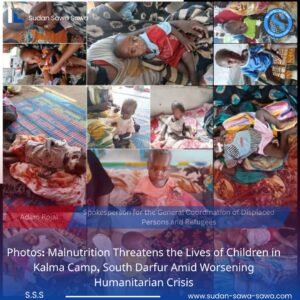
Sudan Sawa Sawa – June 26, 2025
Statement by: Adam Rojal, Spokesperson for the General Coordination of Displaced Persons and Refugees
Malnutrition has worsened the suffering of children in Kalma Camp, South Darfur, where they face a severe lack of food and basic necessities. This is just one example of the deteriorating humanitarian conditions affecting children, pregnant women, and nursing mothers in the camp.
We hope that humanitarian agencies and donors will increase their financial support to address this tragic situation faced by children in displacement camps—especially in Darfur and other parts of Sudan.
“Adam Rojal: Gender-Based Violence Has Become a Weapon to Provoke Victims in Darfur”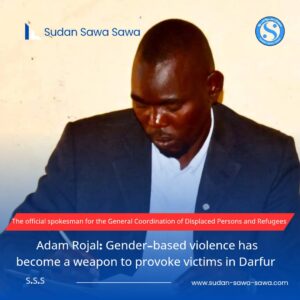
Sudan Sawa Sawa – June 21, 2025
Adam Rojal, the official spokesman for the General Coordination of Displaced Persons and Refugees, stated on his Facebook page: “The situation in Sudan, specifically in Darfur, has reached a critical turning point, where gender-based violence has become the only weapon used by all parties to provoke victims. This represents a significant part of the disintegration of communities in the absence of effective mechanisms to hold those involved in these increasingly violent crimes accountable. Criminals are inventing new types of crimes daily, and achieving justice has become nearly impossible.”
Statement: The Sudan Liberation Movement/ Army rejects the legitimacy of the status quo and call for a comprehensive Sudanese-Sudanese dialogue that ends the war and establishes a democratic state
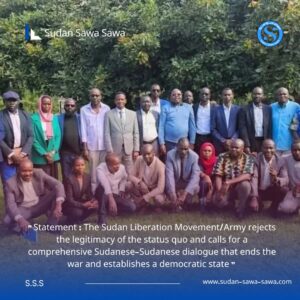
Sudan Sawa Sawa – 21 June 2025
Since the dawn of the Great Revolution, the Sudan Liberation Movement/Army, with its revolutionary action, has been struggling and working for freedom, justice, social peace and building a democratic state, seeking to remove all manifestations of injustice and oppression, to build a state of institutions that achieve the foundations of equality and justice, and to preserve the unity of Sudan’s land and people, away from the projects of dismantling and partition that still threaten the unity of the Sudanese state.
The regime of June 30, 1989 deepened the national crisis when it transformed the state into an ideological project based on political Islam, using the tools of repression, hate speech, the division of society, and the plundering of resources, leading to a total economic collapse and the disintegration of state institutions.
The structural imbalance in the institutions of governance and the dominance of the political elite led to the ignition of absurd wars that exhausted the country and resulted in widespread marginalization, especially in the regions of the rebellious Sudan, with the complete absence and unwillingness to build a national project agreed upon by the daughters and sons of the Sudanese people.
The Sudan crisis did not begin on April 15, 2023, but is an extension of a chronic historical cumulative crisis since the exit of colonialism in 1956, which has been managed by a mentality of exclusion and lack of political vision.
Today, Sudan is going through one of its worst crises in history, as the war has left a horrific humanitarian catastrophe, displacing millions, and grave violations have continued without accountability, halting the path of democratic change and dragging the country to the brink of collapse.
We, in the Sudan Liberation Movement/Army, affirm the following:
There is no military solution to the crisis, and we reject the legitimacy of the status quo. We believe that the solution lies in a comprehensive national dialogue in which all political and civil forces who believe in change and a comprehensive solution to the crisis participate, with the exception of the National Congress and its facades and those who refuse to do so.
We rejected all previous agreements (Abuja, Doha, Juba) because they did not address the roots of Sudan’s historical crisis since independence.
We adopt a neutral attitude towards the ongoing conflict, and focus our efforts on political and humanitarian initiatives to stop and end the war.
We call for the restructuring of the state on new national foundations that consolidate the rule of law and address historical imbalances, with the participation of the sons and daughters of the Sudanese people on the basis of a new social contract in which national rights and duties are guaranteed on the principle of equal citizenship, pluralism and cultural diversity in Sudan.
We seek to form a broad civil front that unites the efforts of peace, stability and ending the war, through a clear political vision that includes all political and civil forces, armed struggle movements and believers in a comprehensive solution, with the exception of the National Congress Party and its facades and those who reject this project.
We recognize the magnitude of the challenges and chaos caused by the expansion of Islamist militias and attempts to undermine the civilian democratic transition. Millions of citizens in Darfur, Kordofan, Blue Nile, the Nuba Mountains and all cities in Sudan have been subjected to systematic violence and crimes against humanity, including murder, rape and forced detention.
We stress the need to hold perpetrators of war crimes, genocide and ethnic cleansing accountable, to bring them to fair trials, and to surrender all wanted persons to the International Criminal Court.
Our national, moral and humanitarian responsibility requires us to protect citizens and displaced persons despite our limited capabilities, and we will continue to work to protect civilians and receive displaced people in liberated areas.
We renew our call to all humanitarian organizations and workers in this field, and to the sincere national forces, to engage in a Sudanese national project that ends the war forever and establishes a secular, federal, liberal, democratic, free and unified state, based on equal citizenship, through a genuine Sudanese-Sudanese dialogue.
Sarah Adam Mohamed Abdel Karim/
Political Sector Officer
Sudan Liberation Movement/Army
“Khalwa “Knowledge is Light”: An Educational Initiative Restoring Hope for Children Who Lost Their Schools Due to conflict in Sudan”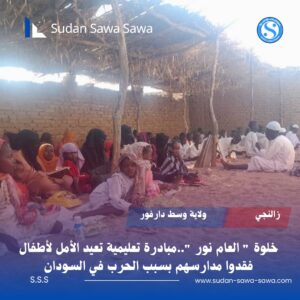
Sudan Sawa Sawa – June 18, 2025
In the city of Zalingei, in a modest corner of a war-torn neighborhood where schools have ceased to operate, Sheikh Abdul Latif Eisa Adam Hamid, a 25-year-old, is striving to instill hope in the hearts of over 155 children through a personal initiative he launched Khalwa called “Knowledge is Light.”
Two years ago, Sheikh Abdul Latif started this project, aiming to restore the education that was interrupted after educational institutions closed on April 15 due to escalating armed conflict. He stated in his remarks to Sudan Sawa Sawa: “I opened the center two years ago after the schools closed. Its goal is to teach children reading, writing, and memorization of the Quran, as well as to instill morals and proper behavior, especially since the conflict has affected how children interact in their daily lives.”
The center accepts children aged between 7 and 14 years and operates in two shifts: a morning session from 6:30 AM to 12 PM and an afternoon session from 2:30 PM to 5 PM. Each student pays a nominal fee of 2,000 Sudanese pounds, but challenges remain. Sheikh Abdul Latif notes that the location is not designated or permanent; it is hosted in a neighborhood mosque and lacks the most basic infrastructure, including shelter from rain during the rainy season, which sometimes forces him to temporarily close the center.
Despite limited resources, some students are making notable progress. Some have reached the middle of the Quran at Surah Al-Kahf, while others have completed the initial sections, and some are still in the process of learning the letters.
Among these children, the voice of Abdul Nasser Ahmed Hamza Adam Ahmed, a twelve-year-old boy, stands out as he shares his painful experience with a reporter from Sudan Sawa Sawa: “I entered the center two years ago because there was no other place for education. After the morning session, I play with my friends in the street. I wish I could return to school, and if it opens again, I will go back immediately because I want to become an engineer. But two years have passed, and I see no hope for that.”
Sheikh Abdul Latif’s story and the “Knowledge is Light” center embody the suffering of thousands of Sudanese children who have been deprived of their right to education. It narrates a harsher reality when learning shifts from an institutional system to individual initiatives that struggle with a lack of support and poor resources. Nevertheless, these initiatives continue to insist on nurturing hope in times of conflict.
“Displaced People in Darfur Face Hunger and Illness at Dar Al-Salam Shelter Amid Lack of Humanitarian Support”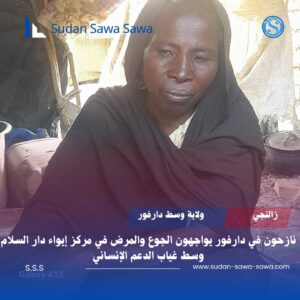
Sudan Sawa Sawa, June 17, 2025
Fatima Ahmed Mohamed shares her story with a reporter from (Sudan Sawa Sawa) as the rainy season approaches, which brings both rain and hope. Fatima, 47 yrs, lives in a house made of straw and a tattered piece of cloth in front of a classroom that has turned into a shelter at the Dar Al-Salam school in Zalingei, Central Darfur. She cradles her child, who is suffering from malaria, gazing into the horizon without hope. A widow and mother of eight, Mrs. Mohamed( Fatima) recounts her plight that began when the armed conflict in Darfur forced her to flee from the “Kirkira” camp in Kabkabiya, North Darfur, finding herself displaced for the second time in less than a year.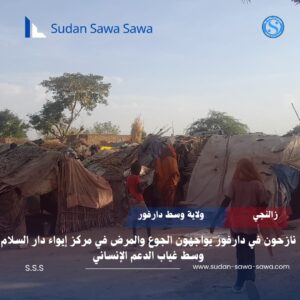
Daily Struggles with Hunger and Food Insecurity:
“We collect leftover food from the markets or knock on doors asking for charity,” says Mrs. Mohamed, pointing to her eldest daughter, who goes out every morning searching for a meal. The food crisis at the Dar Al-Salam shelter shows no signs of abating, as displaced families do not receive regular food assistance and live in economic conditions that prevent them from purchasing even the most basic necessities.
The Rainy Season Brings Illness and Misery:
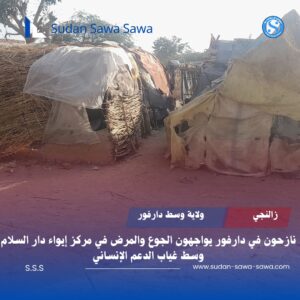 As the rainy season begins, suffering increases at the shelter, where families live in classrooms without windows or safe roofs. The absence of medicine and a shortage of medical personnel have led to a rise in malaria and infections, particularly among children. “Every night, we stay up with our children trying to reduce their fevers, but there is no medicine or doctor,” Mrs. Mohamed adds sadly.
As the rainy season begins, suffering increases at the shelter, where families live in classrooms without windows or safe roofs. The absence of medicine and a shortage of medical personnel have led to a rise in malaria and infections, particularly among children. “Every night, we stay up with our children trying to reduce their fevers, but there is no medicine or doctor,” Mrs. Mohamed adds sadly.
No Land to Cultivate and No Assistance Given:
Despite the arrival of the planting season, most displaced people in Darfur, like me, do not own land to cultivate or money to rent it. Agricultural tools and food supplies are scarce or nonexistent. “How can we plant when we can not find food for today? A person cannot work when they are hungry,” she says, pointing to a handful of coarse millet in a small bag beside her.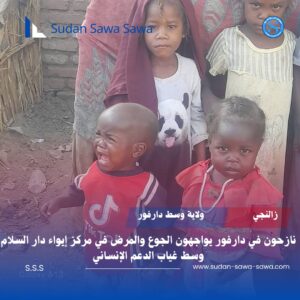
Limited Humanitarian Aid Does Not Meet Needs:
Despite the efforts of some humanitarian organizations, the support provided is insufficient. Fatima explains that the meals offered in the past week consisted of only two breakfasts, while the number of displaced people and their needs continue to rise.
Basic Needs of Displaced Families at Dar Al-Salam Center:
– Rain-resistant shelter and essential supplies
– Daily food sufficient for children and women
– Medicines and treatments for prevalent diseases
– Clothing and personal hygiene items
Conflict Has Destroyed Lives Before Homes:
“I lost my husband in an airstrike while we were trying to flee,” Mrs. Mohamed recounts, tears choking her voice. She adds, “My children suffer from chronic illnesses, and some have psychological disorders. The conflict has destroyed us from within before it took our homes.” She ends her story with a humanitarian plea: “We just want to live with dignity… and to find someone who sees us.”
“Farmers’ Alliance: Rising Production Inputs Threaten Summer Agricultural Season”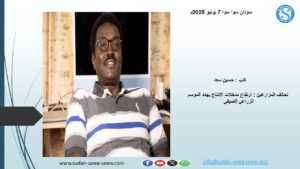
By: Hussein Saad
Sudan Sawa Sawa, June 07, 2025
The Farmers’ Alliance of the Gezeera and Managil Projects has confirmed that the rise in agricultural production inputs threatens the success of the summer crop season. They noted that the price of a bag of urea fertilizer has reached 90,000 Sudanese pounds, up from 30,000 pounds last year. The price of DAP fertilizer has also increased from 40,000 pounds last year to 120,000 pounds. Meanwhile, banks have closed their doors to farmers who have had their funds, property, and savings seized, leaving them unable to prepare their lands.
The Alliance highlighted the lack of sufficient dredgers to remove silt from large canals and drains, as well as the absence of the Abu-20 excavators in many sections of the project. This is despite repeated statements from the project’s governor about contracting with excavator owners. They confirmed that there are over a thousand breaches in the irrigation canals, with only a few of them repaired. This situation leads to water wastage, flooding in some villages, and the spread of waterborne diseases. Additionally, the proliferation of brick kilns in the drains threatens the operation of dredging machinery.
In a statement reviewed by the Alliance, they noted that they had received promises from the project governor to provide free seeds to farmers, but this had not materialized by June 1, 2025. This delay has pushed back the agricultural season beyond the recommended timeline set by agricultural research management. For example, peanut planting should begin on May 25, cotton on June 1, and corn on June 15. The statement emphasized that any crop planted outside its optimal timeframe will have reduced yields, and rainfall can hinder crop cleanliness.
The Alliance urged the relevant authorities and local, regional, and international organizations to support the project and its farmers. They pointed to reports from the United Nations highlighting a food gap and the risk of famine for millions of Sudanese citizens, underscoring the importance of focusing on agriculture. The Gezeera Project is one of the largest agricultural projects in Sudan, covering an area of over two million acres and providing food for the entire country, especially for more than six million people in the Gezeera State.
“The Death Anthem Between Juba’s Peace and Kamal Idris’ Government: An Agreement Deteriorating Under the Fires of War”
Written by: Mohy El-Deen Mohamed
Sudan Sawa Sawa, June 5, 2025
On August 31, 2020, the capital of South Sudan, Juba, witnessed the signing of a historic peace agreement between the Sudanese transitional government, represented by the then-Prime Minister, and several armed movements under the umbrella of the “Revolutionary Front.” The agreement carried high hopes for the Sudanese people, aiming to end prolonged wars and achieve comprehensive political and economic stability. However, it quickly stumbled into the traps of political calculations and military conflicts.
Agreement Provisions and Post-War Dreams:
The Juba Agreement included eight main protocols, most notably:
– Integrating armed movements into regular forces and dissolving militias.
– Implementing transitional justice across all regions of Sudan.
– Compensation and reparation for those affected by conflicts.
– Developing marginalized communities such as nomadic tribes and pastoralists.
– Equitable redistribution of wealth and economic rights.
– Addressing the issues of displaced persons and refugees.
– Resolving land and property disputes.
– Power-sharing through representation of armed movements in transitional governance institutions.
Based on these provisions, leaders of the armed movements entered the political scene and assumed high-ranking positions; for instance, Mini Arko Minawi was appointed Governor of Darfur region, and Jibril Ibrahim became Minister of Finance, alongside members in the Sovereignty Council such as Al-Hadi Idris and Al-Taher Hajar.
An Agreement Becomes a Tool of War:
What initially seemed like a new dawn for Sudan soon turned into a stage for conflicting loyalties and the entrenchment of power. Most leaders of the armed movements sided with the Rapid Support Forces led by Mohamed Hamdan Dagalo (Hemedti), against the army led by Abdel Fattah al-Burhan. This division led to the establishment of a parallel government in Khartoum under the Rapid Support Forces, in contrast to a “de facto” government in Port Sudan.
Kamal Idris: A Prime Minister Without Legitimacy?
Amid this chaos, the name of Professor Kamal Idris emerged, recently appointed as Prime Minister by the Port Sudan government, amid widespread skepticism regarding his legal legitimacy. The absence of a legislative council and the lack of consensus among political forces on the ground make his appointment a contentious issue; many view it as a means to beautify the face of the military authority rather than a genuine step toward halting the war.
Idris’s statements have not shown positive indicators toward stopping the war or providing a clear economic vision. Instead, he appears to many observers as an additional voice in the chorus of the military, lacking a political base or popular legitimacy that would enable him to play an effective role in this critical phase.
Armed Movements Facing Two Bitter Choices:
The armed movements that signed the Juba Agreement now face two stark options: either fully comply with the Port Sudan government to receive the scraps of power offered to them, or risk losing their current positions within state institutions. This has stripped the agreement of its original meaning, turning the representation of movements into a means of legitimizing a new war rather than a bridge to peace.
Ongoing Crimes and Humanity Paying the Price:
The ongoing war in Darfur, Kordofan, and elsewhere has resulted in thousands of deaths, particularly in the city of Geneina, where massacres against displaced people have occurred, leading to mass displacement toward Jebel Marra, the stronghold of the Sudan Liberation Movement led by Abdul Wahid Mohammed Nour. Furthermore, displacement camps have transformed into military bases, and civilians are being used as human shields, in a blatant violation of international norms and laws, amidst a troubling silence from the international community.
Is There a Way Out?
While the African Union considered Kamal Idris’s appointment a step toward possible civilian governance, the United Nations maintained a cautious stance, merely calling for an end to the war and the delivery of aid. Meanwhile, the internal situation in Sudan is witnessing critical developments in Kordofan that may determine the fate of the war and the government itself, as the military conflict threatens even the power balances within Port Sudan.
Conclusion:
The Juba Agreement, which was born as a national project for peace, has now turned into a dead document used to justify fighting and divide influence. Kamal Idris’s appointment is merely an attempt to recycle military power under a civilian guise, while the Sudanese people continue to pay the price for a struggle in which they have no stake.
The moment calls for a return to a comprehensive national project that includes everyone, rooted in genuine civilian will that prioritizes the interests of the nation above power calculations. Otherwise, the war will continue to spin in a vicious cycle, epitomized by the death anthem… in the name of peace.
“Sudan: Land of Heroism and Revolutions (10)”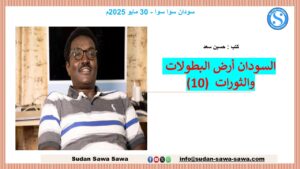
By: Hussein Saad
Sudan Sawa Sawa, May 30, 2025
We continue to explore the similarities between the April 1985 and December 2018 revolutions in Sudan. Here, we revisit excerpts from an article by Professor Taj Al-Sir Osman titled “On Its Fortieth Anniversary, What Are the Lessons of the March-April 1985 Uprising?”
The April uprising was not a spontaneous event; rather, it was the result of a long history of struggle by the Sudanese people against the dictatorship of the Nimeiri regime. This struggle took various forms, including armed resistance in Al-Jazeera Aba, which the regime brutally suppressed, reflecting the fear and weakness of the military dictatorship. There was also resistance from the officers of the July 19, 1971 coup, who overthrew the individual rule. After their failure, military leaders such as Captain Hashim Al-Atta, Major Babikr Al-Nour, and Captain Farouk Osman Hamdallah, along with Communist Party leaders like Abd Al-Khalik Mahjoub and Al-Shafi Ahmed Sheikh, were martyred. Thousands of communists and democrats were arrested and displaced after July 1971.
Following the bloody July 22, 1971 coup, popular resistance continued. There were demonstrations and sit-ins by students of technical schools in 1972, protests against sugar price increases in May 1973, which forced the regime to retract, and the August 1973 uprising led by the University of Khartoum Students’ Union and various trade unions. In 1974, medical students protested during the silver jubilee of their college against the tyrant Nimeiri. In December 1973, students at the University of Khartoum staged a sit-in demanding the restoration of their union, the release of detainees, and freedom of political and intellectual activity at the university. Protests erupted against price increases, and high school students demonstrated in the capital and regions in 1974 to reclaim their unions and oppose school regulations that suppressed their rights to independent political and intellectual activity. Ultimately, they succeeded in reclaiming their unions.
What is the Alternative?
Al-Sir continues: In January 1974, the Central Committee of the Sudanese Communist Party answered the question of what the alternative was by issuing a document titled “With the Masses on Their Issues and Questions Regarding: The Alternative – Leadership – Tools.” This document proposed a general political strike and popular uprising as tools to overthrow the regime. In September 1975, a coup attempt led by Major Hassan Hussein occurred, resulting in the closure of the University of Khartoum and trials for the coup leaders, who were executed in “Wadi Al-Hamar” near Atbara city.
On July 2, 1976, there was armed resistance from abroad organized by the National Front (including the Umma Party, the Democratic Unionist Party, and the Muslim Brotherhood). After the failure of this attempt, military and civilian leaders (like Brigadier Muhammad Noor Saad) were executed, and detainees faced brutal treatment, with some Sudanese opposition members labeled as “mercenaries.”
In August 1977, a national reconciliation was achieved, allowing parties like the Umma Party (led by Sadiq Al-Mahdi), the Democratic Unionist Party (led by Mohamed Osman Al-Mirghani), and the Muslim Brotherhood (Dr. Hassan Al-Turabi’s group) to participate in the executive and legislative powers. The Communist Party, the Unionist Party (the Sharif Al-Hindi group), and the Ba’ath Party refused to participate under the dominance of the one-party system and Nimeiri’s agenda, which aimed to divide the opposition and prolong its rule while recovering from the continuous blows dealt by the opposition.
After the National Reconciliation:
Following the national reconciliation, popular movements continued to thrive. There were strikes by teachers, technicians, and railway workers, as well as uprisings in various cities (such as El Fasher, Sinja, Sennar, and El Obeid), student protests, and strikes by doctors, engineers, judges, and farmers. Lawyers fought for democratic rights and freedoms, holding ongoing seminars at the Lawyers’ Union against laws that restricted freedoms.
In May 1983, after Nimeiri’s breach of the Addis Ababa Agreement regarding the division of the South, rebellion erupted again under the leadership of the Sudan People’s Liberation Movement, led by John Garang. Tensions escalated further after the declaration of a state of emergency and the September 1983 laws, which aimed to suppress the growing resistance of the opposition. However, resistance intensified following the implementation of these laws amidst widespread famine, deepening poverty, and misery exacerbated by the conditions imposed by the International Monetary Fund since 1978. These conditions led to currency devaluation, a collapse of agricultural, industrial, and service production, continuous price increases, and shortages of petroleum products.
Moreover, Sudan lost its national sovereignty by participating in the Rising Star military maneuvers, the airlift of Ethiopian Jews to Israel, and facing external debts that reached $9 billion. Corruption became rampant, railways and river transport deteriorated, and the Gezira Scheme suffered ongoing decline. Resistance against the September laws persisted, culminating in widespread public outrage over the execution of the martyr, Professor Mahmoud Mohamed Taha, on January 18, 1985.
Subsequently, resistance began to take more organized and unified forms, leading to the formation of a trade union coalition and political forces that spearheaded the March-April 1985 uprising. This was triggered by price increases announced by the regime on March 1, 1985. Protests erupted in cities like Atbara from March 1 until April 6, when the trade union coalition declared a general political strike and civil disobedience, halting production and paralyzing state functions. Ultimately, the military council sided with the people and announced the overthrow of the regime.
Popular Resistance:
From the narrative above, the depth and breadth of the popular and military resistance against the regime are evident, accumulating daily until the moment of the comprehensive explosion against it. The recent protests by students at the Islamic University acted as the spark that ignited the pent-up anger against the regime. Prior to these protests, there had been numerous demonstrations and popular uprisings, as noted earlier. So why did a comprehensive uprising against the regime not occur sooner?
The experiences of the Mahdist Revolution, the October 1964 Revolution, the March-April 1985 uprising, and the December 2018 Revolution in Sudan illustrate that an uprising occurs when both objective and subjective conditions are met. These conditions include: a deep crisis affecting society as a whole, a state of widespread discontent among the masses that prevents them from enduring the old regime, and another deep crisis within the ruling class that leads to division and conflict over how to exit the crisis. This conflict paralyzes the repressive apparatus from fulfilling its functions and undermines the ideological tools used to mislead the masses. (To be continued)
“The Impact of Political Coalitions on Stability in Sudan”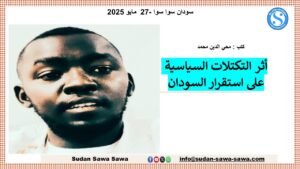
By: Mohyeldeen Mohamed
Sudan Sawa Sawa, May 27, 2025
Summary:
This paper examines the role of political coalitions in Sudan from 1956 until the December 2018 Revolution, focusing on how these coalitions have influenced the country’s stability. It notes that party coalitions have often been driven by narrow interests—be they ideological, regional, or tribal—leading to deepening political and social crises and increasing the state’s fragility and the fragmentation of its national fabric.
Introduction:
Since 1956, Sudan has experienced a tumultuous political journey characterized by conflicts among political forces, military coups, and armed struggles. Political coalitions have significantly shaped this situation, from the powers that inherited authority from colonial rule to revolutionary and armed movements.
I. Political Coalitions and the Legacy of Colonialism
British colonialism employed a “divide and rule” policy, which divided Sudanese society along ethnic and regional lines. After independence, these policies persisted indirectly, with the ruling elites inheriting tools of power without a unifying national project, resulting in the exclusion of vast areas of the country.
II. Weak National Project and Lack of Consensus
A unifying national vision was absent amid ongoing conflicts between the right and left. The lack of a permanent constitution representing all components exacerbated crises, particularly in the south, where demands for federalism emerged early on. This led to the outbreak of civil wars that affected the unity and stability of the state.
III. Militarization of Politics and Politicization of the Army
The Sudanese army has played a central role in political life since independence, with several coups, the last being Nimeiri’s in 1969. The army became involved in executing party agendas, transforming it into a tool for conflicting political elites rather than a neutral national institution.
IV. Armed Conflicts and Marginalized Identities
Political, cultural, and economic marginalization contributed to the escalation of conflicts in Darfur, the Nuba Mountains, and Blue Nile. Prominent leaders from these regions, previously affiliated with the Islamic movement, rebelled, demanding rights for their peoples. This revealed the deep crisis of cultural diversity and identity in Sudan, which has not been adequately addressed.
V. Weakness of Armed Movements and Organizations
Despite the proliferation of movements demanding change, most lack comprehensive national visions, often adopting tribal or personal agendas, which weakens the chances of achieving real transformation. Political agreements frequently end with power and wealth sharing without enacting genuine institutional reforms.
VI. The December 2018 Revolution and the Shift in Political Consciousness
The December 2018 Revolution marked a pivotal moment in Sudan’s political history, expressing overwhelming popular rejection of the military Salvation regime that lasted thirty years. This revolution reignited discussions on the concepts of civil state, justice, freedom, and equality.
The previous regimes established tribal militias that committed horrific violations, including genocide and ethnic cleansing, particularly in Darfur and the Nuba Mountains. After Bashir’s ousting, the regime left a heavy legacy in the form of the Rapid Support Forces and Islamist factions within the army, alongside military leaders beholden to the Muslim Brotherhood.
Following the glorious Sudanese revolution in December, the Forces of Freedom and Change emerged as a political organization, along with leaders from armed movements who later signed the Juba Peace Agreement with Rapid Support Forces leader Mohamed Hamdan Dagalo (Hemeti). This agreement came amid significant political transformations following the revolution, which began its roots in 2015 with the “Down with the Regime” campaign initiated by the Sudan Liberation Movement led by Abdel Wahid Nour, later adopted by the Sudanese Professionals Association, before expanding in 2018 to include most Sudanese cities demanding the overthrow of military rule, ending Islamist dominance, disbanding militias, rescuing the economy, and establishing an independent civilian government.
The Salvation regime was deemed the worst model of governance experienced by the Sudanese people; most of its leaders are wanted by the International Criminal Court, including Bashir, Ali Kushayb, Ahmed Haroun, and Musa Hilal—Hemeti’s cousin. Despite Bashir’s fall, the Sudanese street continued to demand the removal of all symbols of the previous regime, which had plunged the country into international isolation, supported terrorism, hosted figures like Osama bin Laden, caused a suffocating economic blockade, and led to the secession of South Sudan in 2011.
In 2019, following the regime’s downfall, General Ibn Auf declared a state of emergency, but it was short-lived, and power shifted to the Transitional Military Council led by General Abdel Fattah al-Burhan and his deputy Hemeti. On July 3 of the same year, military forces stormed the sit-in at the General Command, committing atrocities against peaceful protesters, a crime acknowledged by military council member General Shams al-Din Kabbashi, stating, “All units participated… and what happened happened.”
This storming marked the beginning of attempts to undermine the revolution, especially after the Forces of Freedom and Change signed an agreement with the military council, leading to the formation of a civilian government headed by Abdullah Hamdok. However, party quotas and political forces loyal to the previous regime conspired to undermine the government, with assistance from elements within the army. As crises escalated, Hamdok resigned, leading to sharp divisions within the military institution, the Rapid Support Forces, armed movements, and revolutionary forces, culminating in the outbreak of war on April 15.
Conclusion:
Stability in Sudan requires a genuine national project that recognizes diversity and establishes a state of law and citizenship. The military institution must be restructured to guarantee democracy, free from politicization. This cannot be achieved without dismantling narrow coalitions and forming modern political forces that prioritize the nation first.
“Sudan – Land of Heroism and Revolutions (9)”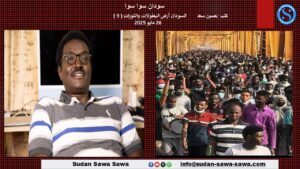
Sudan Sawa Sawa, May 26, 2025
By: Hussein Saad
To understand the similarities and key differences in the role of trade unions during the previous transitions of October 1964 and March/April 1985, compared to the transition following the December 2018 Revolution, we refer to a presentation by Dr. Al-Wathiq Kamir titled “The Union and Politics: The Role of the Trade Union Movement in Transition.” He delivered this at a seminar organized by the Communist Party branch in Toronto. Kamir stated that he would focus on the 1985 transition for two reasons: first, he was a witness and an active participant in the trade union movement, serving on the executive committee of the Sudanese University Professors’ Union at that time; and second, the two transitions share many similarities, such as the nature of political parties and their relationship with trade unions, as well as the institutions of the transitional period, with each transitional government lasting no more than one year.
However, this comparison must consider a methodological point: the current transitional period following the fall of the National Salvation regime has not yet concluded, making it difficult to compare it with the previous transitions, which reached their logical endpoints, including the holding of elections—the first step in the democratic transformation process. Thus, it is challenging to ascertain the implications and outcomes of the current transitional period; the only indicator lies in reading the available signs.
Strength of the Unions:
Kamir added that although both the state and civil society in Sudan have historically been characterized by weakness, the trade union movement managed to retain a degree of strength and vitality until 1989, despite 16 years of totalitarian rule under Nimairi. It maintained relative influence compared to other civil society organizations. The May regime (1969-1985) introduced a new political concept to the labor movement: “partners, not employees,” under the umbrella of the slogan of the General Workers’ Union, and according to the Unified Trade Union Law of 1971. This had a significant impact on labor unions, leading some to refrain from participating in the March/April uprising. Labor leaders emerged from within the unions following the split in the Communist Party in 1971. This situation ultimately allowed unions and professional federations to take a leading role and directly contribute to the overthrow of Nimairi’s regime.
A simple comparison between the roles of labor and farmer unions (especially the Gezira Farmers’ Union) in the October Revolution and their roles in the March/April uprising illustrates a decline in this involvement. For example, laborers and farmers held two ministerial seats in the first transitional government of Sirdar Al-Khatim, whereas there was minimal representation for the labor movement and farmers’ unions in the transitional government of Al-Jazouli Dafallah, and none in the two transitional governments following the December revolution.
The 1989 Coup:
The coup of June 30, 1989, marked a fundamental turning point in the development of the Sudanese trade union movement. After the coup, the National Salvation Authority dissolved all unions and arrested and dismissed thousands of workers and union leaders. The regime imposed the Trade Union Law of 1991, which diverged radically from the historical labor movement rooted in democratic traditions regarding the organization of labor union activities. This law restricted union freedoms and internal democracy by imposing numerous constraints on union activities, particularly failing to distinguish between trade unions for workers, professionals, technicians, and teachers. Instead, unions were defined by “establishments,” merging all these professions into one. Thus, “worker” became any person performing any type of work as long as they received compensation in the form of a wage or salary. This definition completely obscured the concept of shared interests among workers in a single profession. This development further weakened the trade union movement during the era of the National Salvation, especially amid the shift from the public sector to the private sector, which contradicted the concept of the establishment-based union.
First Difference:
Trade unions in Sudan have historically been founded on democratic principles. The internal organization of unions is governed by the principle of free elections, from the grassroots to the general assembly and the executive office. Decision-making is characterized by multiple platforms and a system of delegation that holds leaders accountable to the membership, which retains the right to summon and question any leaders. Even during the era of the one-party system under the Socialist Union, unions were allowed to conduct free and fair elections. The coalition also played an active role in drafting the Trade Union Law approved by the elected government in 1987, which was later suspended by the National Salvation Authority. The debate continues since the fall of the regime in April 2019 regarding the law that will govern the restructuring of unions, and the draft prepared by the Ministry of Labor has not yet reached consensus. In my opinion, any law governing trade union activities should undergo broad discussion involving union members, who are the true stakeholders.
Second Difference:
In March/April 1985, there was a consensus among all political currents represented within the union membership, as well as among the majority of non-political union leaders. The trade union coalition remained cohesive and unified until the end of the transitional period, in contrast to the splits seen in the Professionals’ Coalition during the December transition, where one faction joined the ruling partners while another chose to be in opposition. The democratic nature of the union allowed participation from all factions according to their share of votes (e.g., the Sudanese University Professors’ Union, the Sudanese Medical Association, and the General Engineers’ Union). The split within the Professionals’ Coalition is unfortunate and detrimental to the unity and future of the professional trade union movement. This type of division has not been witnessed before, and there are no democratic mechanisms to address it, necessitating action from union members and leaders.
Third Difference:
The political landscape in 1985 (and earlier in 1964) is vastly different from the scene following the December Revolution. There was a consensus between the trade union coalition and political parties on transitional institutions after signing the uprising charter, along with a relatively cooperative relationship with the military members of the transitional military council, aside from some disputes, particularly regarding election laws concerning modern power circles or graduates. In contrast, the current transitional period is marked by discord and tension in these relationships. Kamir noted that the two major parties have changed their status from what they were in October or April, even fracturing into multiple factions. Additionally, the number of parties has proliferated, and armed movements have entered the political arena following the signing of the Juba Peace Agreement. On another front, the transitional institutions have become more complex, lacking a Sovereign Council or even consideration of a legislative council. There is no formal council of ruling partners, unlike the alliances formed in October or the National Coalition for the Salvation of the Nation. Despite the Professionals’ Coalition’s notable coordinating role, the Forces of Freedom and Change represent a broad and loose umbrella encompassing various alliances, leaving little room for independent influence in the government. In 1985, nominations for the transitional cabinet were made by the trade union coalition in consultation with the parties, regardless of the disappointing final results.
Fourth Difference:
A crucial factor that helped unions strengthen their economic and political power lies in their organic and strategic position within productive and service institutions owned and managed by the state. The labor movement thrived under the dominance of the public sector in the economy until the National Salvation regime initiated significant transformations in economic structures and policies, driven by narrow political motives favoring the private sector, particularly the parasitic sector. With the decline of institutions such as Sudan Railways, mechanical transport, and the Gezira Scheme, the sources of power for labor and farmers’ unions have dried up. This transformation warrants a serious dialogue about its implications for the future of the labor movement.
“Children: Victims of Deferred Dreams”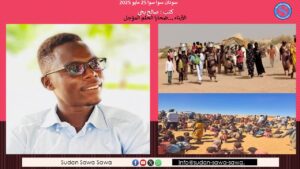
Sudan Sawa Sawa, May 25, 2025
By: Saleh Yahya
Deep within every father lies an unfulfilled dream, a wish thwarted at the doorstep of poverty, or lost in a valley of necessity, or withered under the weight of tradition. A father carries this dream like a hidden burden, setting it aside at times, only to remember it when he sees his son growing up… projecting it onto him unconsciously, as if it were a legitimate inheritance, a legacy that cannot be relinquished.
But… can one inherit a dream?
Can a tree be planted in the wrong soil and still be expected to bear fruit?
In our societies, a son is often treated as a shadow of his father, not as an independent being. He is dragged into a profession he did not choose into a lifestyle he did not plan into a partnership he does not feel in his heart, simply because “the father wants it.” The son becomes an extension of another’s will, not his own.
Here, the struggle begins:
Should the son be “obedient” and live a life on the margins?
Or “rebellious,” going against the current, only to be accused of disobedience and ingratitude?
The philosophical paradox here is that society confuses piety with blind obedience.
Piety does not mean erasing your own identity, nor being buried in a grave of traditions.
True piety is being honest with yourself, creating a life worthy of you, and then sharing it with those you love, not living their lives and losing yourself in the process.
In a world where values and standards are changing, insisting on inheriting a profession or repeating an experience becomes absurd. A profession that was great in one era might become a burden in another. A marriage based on an old conception of love may turn into a prison in our different present.
Is it fair for a son to bear the weight of others’ dreams?
Isn’t it unjust to hold him accountable for wanting to be himself?
In such cases, rebellion is not defiance; it is awakening.
It is reclaiming the right to live on our own terms, not on terms imposed upon us.
Let’s say it clearly:
We are not a reflection of what remains unfulfilled in our parents’ lives.
We are complete projects in our own right, entitled to dream as we wish, not as others want us to.
“Death of Dozens of Sudanese After 15 Days of Isolation in the Desert”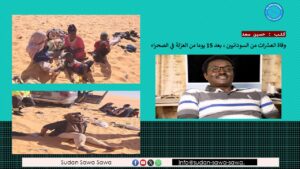
Sudan Sawa Sawa, May 23, 2025
By: Hussein Saad
Eleven people have died from thirst, including women and children, after water and food ran out under harsh desert conditions. Others miraculously survived as rescue teams reached them at the last moment, highlighting the importance of rapid response in such critical situations. This incident reflects the brutality faced by displaced persons and underscores the urgent need for humanitarian support.
The ambulance service in Kufra, Libya, managed to rescue 15 Sudanese citizens after they endured 15 days of isolation in the Sahara Desert due to their vehicle breaking down during a perilous journey of displacement. This incident underscores the significant challenges faced by those fleeing difficult conditions in their homeland, where risks escalate in the harsh desert environment.
This incident renews calls for enhanced humanitarian responses and ensures the protection of migrants and displaced persons along desert escape routes. As the number of displaced individuals continues to rise due to conflicts, it becomes essential to intensify both international and local efforts to provide necessary assistance and ensure the safety of those facing grave dangers in their quest for a better life.
“Sudan – Land of Heroism and Revolutions (8)”
Sudan Sawa Sawa, May 21, 2025
By: Hussein Saad
Experts in labor unions have emphasized the significant role that unions played in the revolutions in Sudan, both before and after independence. They pointed out the exclusion of workers and farmers from participating in transitional governments and overseeing them. They called for the swift implementation of legal reforms in favor of workers and unions, the organization of workers and farmers, and the defense of their rights, while demanding improvements in working conditions and wages, as well as the provision of social services for their members, such as health support, education, and housing.
They stated that the focus of the Professionals’ Association on political struggles has squandered a significant opportunity to establish a union law and prioritize elections for professional bodies. A figure named Sadiq noted in a discussion on Sudan as a land of heroism and revolutions that labor and union struggles against oppressive regimes are often overlooked. He described the association as failing to prioritize elections or expedite legal changes, instead getting embroiled in political conflicts that led to its division and diminished its voice.
Zailai explained that the Professionals’ Association played a major role in the December Revolution, but after its victory, the chance for elected unions during the transitional period was lost. He added, “We are suffering from its consequences now,” and noted that the current division stems from the inexperience of those currently working in unions. He pointed out that the labor union has historically faced several attempts at division but managed to address them through union experience.
Sadiq referred to the May regime, which, following the failed coup of July 1971, amended the union law and issued the 1972 union structure regulations, which altered all union frameworks. This affected the unions’ positions, but starting in 1973, union resistance intensified, peaking after 1977, despite a new union law aligning them with the Socialist Union. Unions, especially professional ones, began to rebel against state authority and the Socialist Union, as they were previously subordinate to a department within the Socialist Union. Strikes and conflicts with the authority did not cease during this period. Sadiq mentioned that unions saw this time as opportune for significant action, leading to the establishment of a coalition union from six unions, which became a center for resistance. Zailai noted that these unions were democratically elected, and their leaders were trusted by their ranks. Thus, they entered the uprising with great strength, and after the fall of Nimeiri, all the union leaders were democratically dismissed.
Leadership Without Bases:
Labor expert Mahgoub Kanari stated that the Professionals’ Association, which led the revolutionary movement, did not open the door for workers and farmers, limiting participation to professional bodies only. This was similar to what happened during the March-April Revolution, where the coalition union excluded the unions that contributed to the revolution from participating in government, unlike the Front of Agencies, which included unions and farmers in the transitional government.
He added, “We tried to convince the Professionals’ Association to include workers and farmers, but they refused.” Kanari accused the Professionals’ Association of being preoccupied with political struggles and neglecting the building of union organizations, thus becoming a leadership without a base. He noted in the series on Sudan as a land of heroism and revolutions that the three revolutions in which unions participated did not focus on overseeing the executive body, leading to a contradiction between leadership and the grassroots, which had specific demands. He concluded, “This weakened the revolutionary component and contributed to the counter-revolution.”
The Vanguard of Change:
In the meantime, teacher’s committee member Ammar Youssef stated that unions have played a significant role in every revolution and change that has occurred in Sudan since the establishment of the Railway Workers’ Union in 1947. They contributed to ending colonial rule in the country and played a major role in opposing tyrannical regimes. He added that, despite the unions’ contributions to overthrowing these regimes, the resulting changes do not meet the aspirations of workers and unions, who are the most organized group with a vested interest in sustaining and protecting a democratic system. Youssef noted the similarities between the role of unions in 1985 and 2019, where they were at the forefront of change.
A Historical Role:
On the other hand, journalist Khalid Fadl emphasized that the role of unions in political work in Sudan is well established throughout history. The term “political strike” has been one of those revolutionary concepts during the entire period of dictatorship in our country. In fact, Sudan’s governance history is predominantly military, not characterized by peaceful and popular movements that have resisted for nearly 60 years. This is a notable paradox, as unions actively contributed to that ongoing resistance. The Professional Associations played a key role in the overthrow of President Abbud’s dictatorship in 1964 and even formed the transitional government after his fall.
During the military rule under Nimeiri in the May regime, unions remained active initially in support of the regime before shifting to resistance after 1971. A prominent feature of the emergence and development of Sudanese unions is their leftist orientation, which is natural given their struggle for workers’ rights. The union coalition was crucial in overthrowing the May regime in 1985, and the transitional prime minister, Dr. Al-Jazouli, came from a union background. When the military took power through the National Salvation coup, Islamists recognized the unions’ role in political resistance, as they represented the most aware social groups. Unions, being modern organizations, became the primary target for suppression from the outset. Indeed, the unions were co-opted and turned into tools for the regime to dominate workers, contradicting their true purpose.
Division Among Professionals:
This reality persisted until the emergence of the Sudanese Professionals Association, continuing the trend of resistance. Unfortunately, the association did not maintain its role as an organization balancing various political factions and expressing the non-partisan revolutionary bloc; it became divided. This was one of the most notable disappointments of the December revolution. Discussions about unions today bring us back directly to the era of the National Salvation.
Currently, there is a full return of all elements from the previous regime, including individuals at the union level. Thus, it is not expected that their role will surpass support for the pro-war faction, as it has throughout the National Salvation period. The prioritization of rights has diminished in this destructive war following displacement, refugee crises, and the abhorrent classification of citizens. Union members who emerged during the brief transitional period have become targets of vilification, persecution, and arbitrary dismissal. The prevailing slogan is that no voice rises above the sound of battle—this is a stark reality. The signs of regional and administrative division are progressing rapidly, making the unions’ chances of playing a significant role in areas such as stopping the war or securing rights for workers and citizens quite slim. We must also consider the intense polarization among civil democratic political forces, including the professional unions themselves, which hinders their influence and contribution.
International Examples:
There are remarkable examples of unions contributing to successful political transitions. Labor unions played a key role in the struggle against apartheid in South Africa and supported the democratic transition. The South African Confederation of Trade Unions was a major member of the opposition alliance that led to the end of apartheid. In Poland, the Solidarity labor union, led by Lech Wałęsa, was a significant catalyst in the transition from communist rule to democracy in the late 1980s. The Tunisian General Labour Union also played a crucial role in the political transition following the Tunisian revolution in 2011, being part of the Quartet that facilitated the national dialogue and was awarded the Nobel Peace Prize in 2015 for its efforts in promoting stability and democracy.
“Sudan: Land of Heroes and Revolutions (7)”
Sudan Sawa Sawa, May 20, 2025
By: Hussein Saad
In 2020, the Al-Ayam Center for Cultural Studies and Development engaged in extensive consultations with union bodies to agree on a unified labor law. During that time, I was part of the working team at Al-Ayam, where we held broad discussions with experts in the field of unions, as well as with professional bodies that formed the Alliance of Professionals and Lawyers, political party union offices, and farmers. These union and political entities initiated a draft labor law for unions, prompting Al-Ayam Center to compile these laws into a unified labor statute.
That same year, a high-level delegation, including representatives from political parties, unions, the Alliance of Professionals, and the Al-Ayam Center for Cultural Studies and Development, which I was managing media for at the time, submitted the Workers’ Unions Law Project of 2020 to Lina Al-Sheikh, the Minister of Labor and Social Development in the transitional government.
The Al-Ayam Center took the initiative to gather all the legal projects proposed by these bodies and held a series of meetings and consultations until we reached a legal draft. The project law consists of seven chapters:
1. The first chapter addresses the name of the law and the date it will come into effect.
2. The second chapter discusses the objectives of the organizations and the legitimacy of their activities.
3. The third chapter focuses on the union structure.
4. The fourth chapter is dedicated to the management of the organizations and the bylaws of unions and federations.
5. The fifth chapter examines union dedication and the guarantees for committee members.
6. The sixth chapter covers the registrar and their deputy, as well as the procedures for establishing organizations, appointing the registrar, their powers, and appealing their decisions.
7. Finally, the seventh chapter pertains to penalties.
The memo delivered with the law to the minister stated that those who participated in the meetings and consultations were guided by the principles and intellectual references represented in the history of the Sudanese labor movement and the influences of political, social, and economic events. It also referenced the Freedom of Association Agreement and the right to union organization, along with ILO Convention No. 98, which prohibits employer interference in union affairs, specifically enticing workers to refrain from joining unions or interfering in their management.
Notably, the entities that initiated these legal projects included: the Alliance of Professionals, the Communist Party, the Democratic Front of Lawyers, the Umma National Party, the Arab Ba’ath Party, the Unified National Federal Party, the Alliance for the Correction and Restoration of Labor Unions, the legitimate unions, and the Sudanese Center for Trade Union Rights and Human Rights.
Call for Discussion and Consensus:
In November 2020, the Al-Ayam Center, in collaboration with the Union Office of the Sudanese Professionals Association, organized a seminar titled “The Labor Movement – Opportunities and Challenges” in the main hall of the Ministry of Higher Education in Khartoum. Mahgoub Mohamed Saleh opened the seminar, calling for further discussion to reconcile the two draft laws prepared by the Ministry of Labor and the Sudanese Professionals Association in cooperation with Al-Ayam Center.
In a paper presented at the seminar titled “The Current Labor Landscape: Opportunities and Challenges,” Mahgoub stated that the issue cannot afford divisions, as most foundations related to establishing labor unions have been agreed upon and are included in international agreements and charters. He noted that the Al-Ayam Center focused on the issue of unions during the transitional period, having observed the existence of multiple draft laws totaling 11. The Center succeeded in unifying these into a single draft law that received acceptance from all participants in the discussions.
Mahgoub pointed out that after the unified draft law was submitted, another law prepared by the Ministry of Labor and Social Development was revealed. He urged for more efforts to expedite the unification of the two draft laws into one, allowing for the re-establishment of the labor movement on foundations agreed upon by all, particularly as he mentioned that “there is not a significant disagreement between the two laws.”
Unions and International Agreements:
In his paper titled “The Labor Movement, Law, Agreements, and International Treaties,” lawyer Omar Al-Farouq Shemina criticized the “Establishment Law,” which he said first appeared in 1971, describing it as an exception. After explaining its provisions, he stated that unions are based on crafts, professions, and sectors, not on establishments.
Shemina emphasized that the unified law proposed by the Professionals Association to the government is the most mature labor law, resulting from significant academic and technical efforts combined with rich practical experience. He indicated that it does not conflict with international agreements and treaties, ensuring independence, unity, and democracy.
He expressed surprise at the Ministry of Social Development and Labor’s claims that the unified law is a political party law, considering it a weak argument that highlights attempts to remove the labor movement from the political arena and replace it with civil society organizations. Shemina also criticized the notion of workers joining two unions, stating that international labor laws prohibit the establishment of more than one union for workers. He pointed out that the Ministry’s law strips unions of their most important characteristic—independence—by granting extensive powers to the labor registrar. In contrast, the unified law he participated in drafting grants registration rights to a judicial registrar.
He noted that international agreements are based on three pillars: the government, employers, and workers, with international law prohibiting these entities from interfering in workers’ rights and affairs.
Resistance and Confrontation:
In a recorded message from London, legal and union expert Sidik Al-Zailai discussed the characteristics and features of the labor movement in Sudan. He emphasized that the movement began and has continued democratically, focusing on electing leaders from the grassroots. However, military and authoritarian periods have attempted to subdue the labor movement, making it a servant of the authorities rather than the workers.
Al-Zailai asserted that unions have remained resistant and confrontational, fiercely defending their rights while striving to uphold democratic practices and combat internal divisions. He highlighted their support for and establishment of labor movements across the Arab world and Africa. He identified the current challenge facing the labor movement as ongoing attempts to detach it from politics and urged for the separation of political parties from unions—not for unions to be excluded from politics, which he considers their legitimate right and a representation of their national role.
He called for the preservation of the labor movement’s proud history, characterized by confrontation, nationalism, unity, and democracy. Al-Zailai noted a generational and knowledge gap due to the intentional marginalization of unions over the past 30 years and advocated for the training and development of future union leaders. He pointed out that unions in Sudan were established before the law regulating them was enacted in 1948. He praised the unity achieved among doctors in forming a single body and acknowledged the pioneering role of journalist Mahgoub Mohamed Saleh in unifying the press around the union.
Attack on Labor:
Union members and representatives from the legitimate Sudan Workers’ Union, which was dissolved by the ousted regime upon gaining power, criticized attempts by the former government to undermine the Sudanese labor movement. They expressed astonishment at the revolutionary government’s actions, which seem to follow the same path as the previous regime.
Union member Okasha Abdul Rahman stated that one of the most significant challenges currently facing the labor movement is the law being drafted by the Ministry of Social Development and Labor. He argued that this law contains substantial technical and strategic inaccuracies that undermine the independence, neutrality, and democracy of the labor movement. He added that the ministry’s claims about aligning its laws with International Labour Organization standards are misleading and noted that the ILO aims to weaken the labor movement.
Additionally, unionist Mahgoub Kanari emphasized that labor activism is fundamentally a political and protest-oriented endeavor. He asserted that the current vacuum in union representation is intentional and orchestrated. He remarked that certain local and international political entities aim to strip political life in the country of unions to facilitate the passage of their political agendas and gain control over the country’s key sectors. Kanari considered there is a systematic targeting of future union leaders to diminish their roles, intimidate them, and compel them to abandon their initiatives.
“Sudan: Land of Heroism and Revolutions”
Sudan Sawa Sawa, May 3, 2025
By: Hussein Saad
On March 30, 2020, a group of concerned citizens submitted a memorandum to the Central Council of the Forces of Freedom and Change regarding the current political situation and the overall performance of the Forces of Freedom and Change. The memorandum focused on the challenges of the transitional period, legislative building, the security system, peace, national unity, foreign relations, international cooperation, the national constitutional conference, the economy, public welfare, the unity of revolutionary forces, and the reform and development of the Forces of Freedom and Change.
It warned of the dangers posed by international and regional interventions using financial and economic tools, which threaten the future of democracy in the country. It highlighted the economic lobby allied with remnants of the previous regime, which prevents the complete dismantling of the deep state due to its vested interests. The memorandum criticized the negative aspects of the political agreement that led to the constitutional document, which is fraught with loopholes and ticking time bombs, resulting from the complacency of the Forces of Freedom and Change that produced the current dominant security system and its economic entity beyond control.
Real Risks:
The memorandum stated that there are real risks threatening the democratic system in the country, requiring all of us to be vigilant and develop our organizational mechanisms within the leadership of Freedom and Change and all its constituent blocks. It stressed the need to mobilize all revolutionary forces, especially the Resistance Committees and armed struggle movements.
It pointed out that the worsening economic crisis has led to a decline in popular support for the revolutionary government and its political base, Freedom and Change. “This is a dangerous indicator that must be addressed,” it stated. The delay in establishing the legislative council is also seen as a serious warning, as this council is responsible for evaluating and dismissing the government and its members, approving international agreements and peace treaties, and holding the Sovereignty and Council of Ministers accountable, particularly the military component, along with its other responsibilities outlined in the constitutional document.
Errors in Constitutional Adaptation:
The memorandum described the peace negotiations in Juba as fraught with errors in their constitutional adaptation and highlighted the overreach of the Sovereignty Council into the executive powers of the Council of Ministers. It noted the sidelining of the Peace Commission as stipulated in the constitutional document and the absence of the legislative council. It also pointed out ongoing debates over contentious issues within the Forces of Freedom and Change, such as identity, secularism, and the relationship between religion and the state—topics that had been agreed upon for discussion at the national constitutional conference before the revolution.
The Forces of Freedom and Change are confronted with public demands, which expect a swift halt to the economic decline, reforms for public welfare, the reinstatement of those dismissed from civil and military service, the dismantling of the enabling state, accountability, and the application of justice for crimes committed by the regime since June 1989, including the massacres at the General Command. Furthermore, there has been a failure by the Forces of Freedom and Change to embrace all active forces that contributed to the success of the December revolution, particularly the Resistance Committees, women, the uprising movement, and the coalition of demand issues.
Expected Duties and Responsibilities:
Thus, the urgent duties and responsibilities that were placed on the revolutionary government, the transitional authorities, and the Forces of Freedom and Change as a political incubator are summarized as follows: to manage the revolution in a unified manner until reaching a stage of good governance; to confront the risks posed by the deep state and eliminate remnants of the fallen regime; to counter the international campaign led by certain entities aiming to undermine the democratic experiment in our country and impose a substitute that serves their interests; to eradicate the negative impacts left by the previous regime; and to begin preparations early for the national constitutional conference rather than waiting until the last moments.
Organizational Performance of Freedom and Change:
The memorandum stated that the agenda of the Central Council is overloaded, a result of its centralized grip. It suggested that the solution lies in granting other subsidiary bodies some degree of decision-making authority in a decentralized manner, along with the freedom to form various mass organizations. The memorandum proposed dividing the members of the Central Council into sectors, such as (Revolution Management, Transitional Period Management, Constitution and Law).
It called for activating the advisory council through regular meetings, considering it as a general assembly or conference, and granting it clear powers so that its recommendations and decisions are binding. A specific rapporteur should be appointed for it. The memorandum urged a reevaluation of the current structure and a review of the representation of entities, as well as opening the regulations (general system) for review and amendment to keep pace with all developments and the current situation.
It emphasized that there are critical issues requiring prompt resolution to ensure the safety of the revolution, specifically the formation of the legislative council while reserving a number of seats for armed struggle movements when a comprehensive peace agreement is finalized.
Amoebic Splits:
Professor Juma Kinda summarized in a paper presented at a workshop organized by the Al-Ayam Center for Cultural Studies and Development the roots of conflicts within political forces, exemplifying them with the following points:
1. The ongoing vicious cycle of governance crises, political instability, and the absence of a culture of peaceful power transition in Sudan.
2. The monopolization of ministerial opportunities by certain political figures within each party, who move from one ministry to another.
3. The emergence of amoebic splits within parties, which are not due to fundamental disagreements in principles, ideologies, or methodologies, but rather stem from intolerance of differing opinions.
4. The gap between theory and practice, as well as between values, slogans, and the political behavior and practices of parties and their leaders.
5. The lack of national representation in parties and armed movements (geographically, regionally, ethnically, religiously, class-wise, factionally, and generationally).
6. The economic weakness of parties unless they participate in power, where public funds and state institutions are exploited to finance and implement party programs.
Divergence within the Forces of Freedom and Change and Armed Movements:
1. Some desire to restructure the Sudanese state before elections, while others want to hold elections in a short timeframe.
2. The extent to which the components of the Forces of Freedom and Change can continue to work together to dismantle the existing regime while each party promotes its political program based on its own party references in preparation for elections.
3. How to ensure that political party influences do not affect the candidacies of independent figures nominated by the Forces of Freedom Declaration (indirect allocation).
4. The role of the Professionals’ Association during the transitional phase as a non-partisan civil force aimed at positively influencing political practice and the peaceful and democratic transfer of power, not merely seeking participation in power, both during and after the transitional period, while building strong, independent trade unions and civil society organizations aware of their role in peace, development, and good governance.
Freedom and Change: Formulating a Revolutionary Political Project for Genuine Change?
1. Addressing the counter-revolution without resorting to violence-based tactics.
2. Introducing new political practices and behaviors that turn slogans into lived realities (inclusivity, democracy, managing diversity, integrity, accountability, rule of law, accepting criticism, selflessness, and the etiquette of resignation to take responsibility for political actions that warrant accountability).
3. A comprehensive transformation of the state’s and society’s political, economic, social, and cultural structures.
4. The ability of the forces of freedom and change to remain unified in leading change and achieving democratic transformation.
5. How to ensure that political party influences from the components of the Forces of Declaration of Freedom and other political forces do not affect independent candidates nominated for ministerial positions during their executive duties.
6. The capability of the Forces of Freedom and Change to engage with external regional and international influences, such as the Saudi-UAE axis versus the Qatar-Iran-Turkey axis, and the African axis (African Union and IGAD supporting change and forming a civilian government) against the Arab axis (Arab League and its ambiguous stance)—the African-Arab and African-African axes.
Requirements for a Successful Transition:
1. Finding the Greatest Common Denominator: Seek a shared foundation that allows the Forces of Freedom and Change to remain cohesive despite their differing ideological references throughout the transitional period.
2. Unifying Practices and Political Discourse: Standardize the practices, behaviors, and political discourse among various parties, civil society organizations, and revolutionary movements on key issues such as military reform, peace, democracy, justice, freedom, and foreign policy, to restore Sudan to a stable position, free from opposing alliances.
3. Empowering Youth: Enhance the role of youth and create political and civic conditions to harness their revolutionary energies in support of the revolution and its goals, as articulated by the Forces of Freedom and Change and the resulting documents and institutions.
4. Continued Role of the Professionals’ Association: Ensure that the Professionals’ Association continues to mobilize public sentiment against any counter-revolutionary attempts, although it is noted that the Association is facing numerous challenges, which are expected to increase in the future.
5. Building Trust through Joint Efforts: Strengthen trust-building mechanisms through collaborative work and the creation of strategic or temporary alliances among the components of the Forces of Freedom and Change, in order to avoid polarization and ensure a smooth transitional period that propels Sudan forward, preventing a return to another transitional phase.
“Workers Are the True Owners of Rights”
Sudan Sawa Sawa May 1, 2025
By: Hussein Saad
As May 1st arrives each year, the world turns its attention to Labor Day, an annual occasion that inspires us with values of work and struggle. We remember the sacrifices of the working class and their fight for rights and achievements. On this International Workers’ Day in Sudan, we extend our heartfelt congratulations and appreciation for their struggles, echoing the words of poet Mohamed Hassan Salim Hamid:
“Workers are the true owners of rights; they decide and lead; they determine the course of factories. The hands of workers are what produce—not the American machines. The toil of workers’ hands is cleaner than the lips of the greedy, the devils’ debts, and the interests of the World Bank and all faces of capitalism.”
The courage of Sudanese workers in facing oppression is preserved in our nation’s history. Workers have shown unwavering faith in the value of hard work, standing steadfast in various fields—from agriculture to industry, from services to creativity. They confront challenges with relentless determination, believing that true dignity comes from honest labor and that the progress of our communities is achieved through their strong hands, sound minds, and boundless contributions.
This day symbolizes the historical struggle of the working class for dignity, justice, and rights. It reaffirms that work is not just a means of livelihood but a human value, a source of dignity, and the essence of development, stability, and progress. Workers have paid a heavy price amidst the catastrophic war of mid-April, which has torn the country apart. They have borne the burdens of displacement, poverty, and deprivation, yet they remain at the forefront, sowing hope and creating life despite suffering and harsh conditions.
On this global holiday, we express our support for your just struggle and work towards ensuring a fair environment that safeguards your rights and honors your efforts within a democratic civil state that respects diversity and achieves social and transitional justice, preserving human dignity.
In conclusion, we echo once again the words of poet Hamid:
“In the name of peace, we begin,
With the comfort of our wealth,
As it stretches across our lands,
We sing from the depths of our hearts,
Raising our hands high to revive us.
What is production but the work of our hands?
Our connection has become our legacy,
By the brilliance of workers,
The roots of our valleys.”
“Unions: Workers and Farmers Contributed to All Revolutions, But Change Was Unfair to Them”
Sudan Sawa Sawa, April 30, 2025
By: Hussein Saad
Union experts have emphasized the significant role played by unions in Sudan’s revolutions, both before and after independence. They pointed out the marginalization of workers and farmers in participating in transitional governments, monitoring them, and accelerating the implementation of legal reforms in favor of workers and unions. These unions advocate for workers’ and farmers’ rights, demand improvements in working conditions and wages, and provide social services to their members, such as health support, education, and housing.
Union expert Mahgoub Kanari stated that the Professionals’ Association, which led the revolutionary movement, did not open the door for workers and farmers, limiting participation to professional bodies only. A similar situation occurred during the March-April Revolution, where the union assembly excluded the unions that contributed to the revolution from participating in the government, unlike the Front of Bodies, which included unions and farmers in the transitional government. Kanari added that they attempted to persuade the Professionals’ Association to include workers and farmers, but it refused, accusing it of being preoccupied with political conflict and neglecting the establishment of union organizations, resulting in leadership without a grassroots foundation.
Kanari remarked in a discussion series titled “Sudan: The Land of Heroes and Revolutions,” which addresses the struggles of workers and unions against oppressive regimes, that the three revolutions involving unions did not prioritize oversight of the executive branch. This led to a contradiction between leadership and grassroots demands. He noted, “This weakened the revolutionary component and contributed to the counter-revolution.”
Meanwhile, Amar Yousif, a member of the Teachers’ Committee, stated that unions have made clear contributions to all revolutions and changes in Sudan since the establishment of the Railway Workers’ Union in 1947. They played a vital role in ending colonial rule and opposing oppressive regimes. Despite their contributions to overthrowing these regimes, the resulting changes have not met the aspirations of workers and unions.
In contrast, journalist Khalid Fadl remarked that unions have played confirmed roles throughout history. The term “political strike” has been one of the revolutionary concepts during the eras of dictatorship in our country. In reality, the history of governance in Sudan is a history of military institutions, not peaceful and popular activism, which has persisted for about 60 years in resistance trenches. This is certainly paradoxical. Unions have effectively contributed to this ongoing resistance, with the front of bodies playing a crucial role in overthrowing the dictatorship of Abboud in 1964. They even formed the transitional government following the fall of the dictator during the military rule led by Nimeiri in the May regime, remaining active in support of the early May government before shifting to resistance after 1971.
“Vision Center for Peace and Development
And Taja Organization for Supporting Women, Girls, and Children – Humanitarian Appeal Regarding the Deteriorating Humanitarian Conditions in the “Tawila” Area – North Darfur State”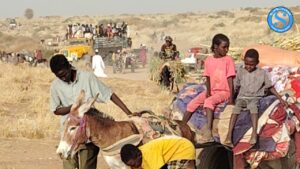
Sudan Sawa Sawa, April 13, 2025
The Tawila area in North Darfur is experiencing catastrophic humanitarian conditions due to a massive influx of people fleeing the ongoing conflict in the city of El Fasher and its surrounding areas. The region has become a refuge for thousands of displaced families who have arrived under extremely harsh conditions, amidst a complete absence of humanitarian organizations and civil society.
Current Situation:
The number of displaced persons has exceeded 10,000 in the past two weeks.
Urgent Needs:
– Food and safe drinking water
– Shelter (tents, tarps, blankets)
– Primary healthcare and medicine
– Sanitation services
– Psychological and social support for women and children
Challenges:
– Almost complete absence of humanitarian and relief organizations
– Lack of health centers capable of accommodating the increasing number of displaced persons
– Severe shortage of food and drinking water
– Risk of disease outbreaks due to environmental contamination and weak infrastructure
Our Appeal:
We at the Vision Center for Peace and Development and the Taja Organization for Supporting Women, Girls, and Children urgently call on the international humanitarian community, UN agencies, and humanitarian and relief organizations to intervene swiftly to save lives and provide immediate support to the displaced in the Tawila area.
We direct this appeal to:
– The United Nations Office for the Coordination of Humanitarian Affairs (OCHA)
– The World Food Programme (WFP)
– The United Nations High Commissioner for Refugees (UNHCR)
– The World Health Organization (WHO)
– All international, regional, and local humanitarian organizations
Contact Information
For communication and coordination:
– Vision Center for Peace and Development: visionsentere.vcpd@gmail.com
– Taja Organization for Supporting Women, Girls, and Children: tajaorgwomen@gmail.com
The situation in Tawila is warning of a humanitarian disaster unless urgent action is taken. We hope that all concerned parties will respond to this appeal and provide immediate assistance to the displaced who are living in dire conditions, as dozens of families continue to flee from El Fasher and its surroundings daily.
“Insights on Awareness of the National Project”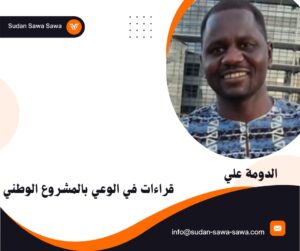
Sudan Sawa Sawa, April 13, 2025
By: El Duma Ali/
Deputy Head of the Revolutionary Liberation Council – France Office – Sudan Liberation Movement/Army – Led by Professor Abdul Wahid Mohamed Nour.
“Kofi Annan: Our mission is to confront ignorance with knowledge and intolerance with tolerance.”
Our mission is to confront ignorance through the dissemination of knowledge and to challenge blind intolerance with tolerance. From this perspective, we must recognize that the foundation of this mission begins with the formation of a collective awareness project that serves oppressed peoples who have suffered from enforced ignorance throughout history. This project requires continuous efforts to liberate these peoples from the educational frameworks imposed on them, whether deliberately or as a result of systematic oppressive regimes that have served the interests of groups hiding behind false national slogans.
Projects aimed at enlightening minds can only be initiated by those who have transcended narrow interests and freed themselves from artificial intellectual constraints that do not reflect the hopes of the people or meet their aspirations. Instead, they deepen the gap between them and their true national project. Hence, the importance of promoting enlightenment methodologies that directly confront systematic ignorance and work to expose and eradicate it through scientific research tools and objective criticism. This involves diagnosing its causes, dismantling its references, and then building new intellectual foundations that take into account an understanding of the roots of crises and defining change objectives derived from a deep comprehension of the realities faced by these peoples.
Often, these crises are based on distorted structures created by elite groups that emerged from narrow circles. They sought to dominate the majority’s resources by controlling public awareness and exploiting resources, using methods of indoctrination, and promoting embellished slogans that embody “divide and conquer” policies. This is accompanied by demagogic rhetoric directed at the general public, which often aligns with the ideologies of these groups, aiming to maintain their historical privileges, even if it leads the nation to the brink of collapse, as is the case in Sudan today.
Therefore, the desired knowledge must be derived from the realities of the people, respecting their cultures, customs, traditions, and spiritual beliefs. These should be recognized and included in a permanent constitution that guarantees rights and duties equally among all citizens and promotes the values of a national state based on full citizenship.
When these legitimate human rights are achieved and become a tangible reality, intolerance will naturally fade away, as it is fundamentally a product of regressive and erroneous ideas that express hatred and rejection of the other. With the disappearance of these ideas, values of tolerance will prevail, creating cohesive societies that are open to one another, governed by the principles and objectives outlined in the constitution, reflecting the collective will of the people within a framework of national sovereignty rooted in the sentiments of the people, free from any external manipulation or misleading ideological slogans.
“War Leaves Widespread Devastation in Higher Education”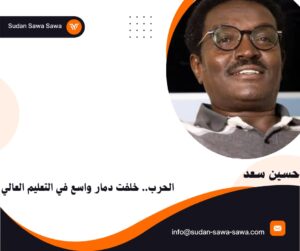
Sudan Sawa Sawa, April 12, 2025
By: Hussein Saad
A study by the Great African Rift Institute titled “The Impact of War in Sudan on Higher Education and the Academic Research Community” confirmed the presence of 39 public universities and 25 private universities prior to the war, with no fewer than 700,000 students and 14,000 university lecturers, of whom 8,000 hold doctoral degrees. The study, prepared by Mona Al-Qadal and Rebecca Ghidled, spans 43 pages and includes an executive summary, a map of Sudan’s border crossings, an introduction, research methodology, background on higher education in Sudan, institutions, the war, and its effects on Sudanese students and academics, as well as external movements involving Egypt, Ethiopia, South Sudan, Uganda, and East African countries.
The study states that the war has caused immeasurable destruction and suffering, posing a threat to vital institutions across the country, including higher education institutions. These establishments have not only faced the destruction of key facilities but also the mass displacement of students and faculty, leading to the disruption of activities in public, private, and community universities. Some institutions have relocated to other countries, while others have resorted to online education with limited resources. Meanwhile, some universities continue to operate to varying degrees, as teachers heroically assist students in completing their studies through online courses. Lecturers send pre-recorded lectures to students via Telegram and WhatsApp, even while receiving only 60% of their already low salaries, which are often paid late.
University administrations have managed to organize examinations periodically in safe areas of Sudan, particularly where government ministries are functioning in the east. The University of Khartoum has provided examination venues in Egypt and Saudi Arabia. However, these efforts have been hampered by the ongoing escalation of the war. The Ministry of Higher Education established a committee under the supervision of Al-Jazira University to monitor educational institutions affected by the war, based in Wad Madani, with directives issued from there. After Rapid Support Forces entered Al-Jazira State in December 2023, the committee’s activities moved to Port Sudan, where its main headquarters has been located since then.
The war has forced many families to flee once again, accompanied by internet outages and the loss of some academic records, including university files. Several facilities, such as laboratories, workshops, libraries, lecture halls, and administrative offices, have been looted or destroyed. The destruction was particularly evident at Omdurman Islamic University, where the library and archives of the Mohammed Omar Bashir Center for Sudanese Studies were burned. The devastation at universities outside Khartoum was significant, especially in Darfur, affecting institutions such as Zalingei, Geneina, and Nyala, as well as Al-Jazira University and Al-Batana University in Al-Jazira State.
The study indicated that some universities successfully preserved digital copies of academic records away from the battles, including Omdurman Islamic University, the University of Khartoum, and Sudan University of Science and Technology. The process of securing academic records took at least six to eight months at the University of Khartoum and is still ongoing at other institutions. Universities that were not affected by the war had the time to safeguard their records, while the status of academic records at private and community universities varied. Some provided backup records on servers outside Sudan and were able to reassure students about their records.
Effects of War on Sudanese Students and Academics:
With the outbreak of war, many fled from Khartoum to other states or outside Sudan. A report from the UN High Commissioner for Refugees in August 2024 revealed that over 10.3 million people were forced to flee, with 2.1 million moving to other countries and 7.9 million displaced internally. These numbers represent a minimum estimate based on monitoring of internally displaced persons (IDPs) and Sudanese registered in neighboring countries as refugees or asylum seekers.
In December 2023, as the war spread to Al-Jazira State, the number of people fleeing increased, with some leaving their possessions, money, and laptops in Khartoum, expecting the war to end quickly or fearing theft during their journey. Among those escaping the horrors of war were university professors, staff, and students. In the areas where they sought refuge, many homes were not built to accommodate the influx of newcomers, and rental prices surged, especially for those who fled to Madani, then to Sennar, Singa, Gadaref, or Kassala, and Port Sudan. During this journey, many lost their remaining cash. Those without relatives in these states or unable to afford high rents ended up living in displacement camps or schools.
There are relatively few professors and students outside Sudan compared to those within the country. Students and graduates face unique challenges, particularly those pursuing master’s and doctoral degrees who are in the research or writing phases, experiencing significant disruptions, data loss, and restrictions on their ability to continue their research. The situation for university faculty members is precarious; some have been dismissed or had their employment conditions altered. The Ministry of Higher Education has been slow to send salaries to universities. The University of Khartoum used its own funds to pay its faculty a single month’s salary, but other public universities were unable to do so after months of war.
Additionally, the Ministry of Finance announced a system where university professors would receive 60% of their salaries, but payments have been irregular and delayed, leaving faculty uncertain about when they would receive their compensation. The value of this 60% has diminished due to the decline of the Sudanese pound against the dollar in the parallel market, while commodity prices have skyrocketed. The Ministry of Finance also suspended salaries for university professors in Darfur due to halted activities there. There has been talk that Zalingei University will resume operations in White Nile State, but this remains uncertain.
Private and community university professors found themselves in even more challenging situations due to the fragility of their employment contracts and the lack of financial support from their institutions. Some private universities that relocated their studies outside Sudan canceled faculty contracts, leaving professors in Sudan without work as they hired new faculty at their new locations. Some universities offer remote work opportunities in online education, which requires internet access and is costly.
Movements Outside Sudan:
Sudanese academics and students are making decisions about where to go based on their economic situations and social ties, just like all displaced individuals. The process of displacement is mentally, physically, and economically exhausting. When the war broke out, air travel became impossible due to the bombing of Khartoum Airport and the closure of Wadi Sidna Airport for emergency evacuations. Most travel occurred via buses and vehicles, as people fled to the borders of Chad, Egypt, Ethiopia, Eritrea, and South Sudan. In the early days, some traveled by ferry to Saudi Arabia.
Conditions at the borders varied, and entry requirements differed. The ferries to Saudi Arabia not only required valid visas but also additional permits for boarding from both the Sudanese and Saudi sides. Initially, Eritrea and Ethiopia closed their borders; however, some people managed to cross. By August 2024, more than 47,000 were in camps near White Nile State, facing dire conditions, with some being attacked by armed groups.
Upon entering Ethiopia from Metemma, people were required to travel by bus to Qadar directly, where they would then book flights to Addis Ababa. The border with Chad was fluid, and many fled from Geneina to Chad at the onset of the war. In this situation, some university professors, especially women, turned to alternative professions, such as preparing and selling Sudanese products like perfumes and incense to earn money. Others who had resources opened bakeries and small businesses, while some resorted to teaching in private secondary schools, including those that relocated their activities to Egypt.
Amid all these challenges, in addition to the human cost of this war, students and professors have been killed during fighting between armed factions, and many have died from lack of access to medical care due to the war, which destroyed numerous medical facilities. Additionally, elderly faculty members have succumbed to conditions exacerbated by stress.
Academics in Egypt:
In Egypt, rental prices in Cairo have tripled, exacerbated by the depreciation of the Egyptian pound in late 2023, which has made living costs increasingly high. The rapid rise in the dollar’s value against the Egyptian pound has made obtaining visas relatively easy. However, when the war broke out, Egyptian consular requests in Wadi Halfa surged. On June 1, 2023, the Egyptian government announced that all Sudanese citizens would need to obtain visas to enter the country. The application process became increasingly difficult, with more procedural obstacles and long waiting times.
As conditions deteriorated in Sudan, many resorted to smuggling themselves into Egypt, a highly costly endeavor.
South Sudan:
Entering South Sudan is typically done through several crossing points, mainly via a journey to Kosti and then to Renk, with flights to Juba and other points through Aweil, Malakal, Blue Nile, and Darfur. This travel is costly and arduous. Those who travel to Juba have the option of looking for work there or traveling to Uganda. The journey to Uganda is easier, either by bus or by flying to Entebbe. Entry to Uganda is straightforward, with a visa costing $50, valid for three months, and renewable for a total of six months. Those without the funds for a visa can apply for refugee status by surrendering their passports; however, they would then be relocated to the refugee camp in Kyaka, about 200 kilometers north of Kampala, where conditions are very basic.
Efforts to employ Sudanese academics have been more pronounced for doctors and university professors in medical colleges, although there is some hiring in other fields. The South Sudanese government has made it relatively easier for doctors to practice medicine, leading to a flow of Sudanese doctors to private clinics in Juba, as well as to public and private universities. In 2023, despite the depreciation of the South Sudanese currency, Sudanese university professors were earning relatively good salaries compared to other professions. However, they experienced delays in receiving their salaries and had to cover living expenses due to the conditions in Juba.
Ethiopia:
The situation for Sudanese academics and students in Ethiopia is similar to that of all Sudanese who have arrived there: transitional, intentional, and unstable. Those who entered with a visa can extend it for six months for $600, after which they are expected to leave, although they can apply for another visa. In practical terms, Sudanese lecturers have faced significant difficulties in finding work due to the higher education structure in Ethiopia, which is heavily centralized. Decisions regarding admissions, budgets, and hiring come from the Ministry of Education. During the Tigray War from 2020 to 2022, the Ministry of Higher Education lost much of its funding, severely limiting its budget for external appointments. However, there is a need and potential for Ethiopian universities to hire qualified Sudanese lecturers, particularly those with doctoral degrees who can teach in English.
Sudanese students face an even more challenging situation when it comes to the possibility of enrolling in Ethiopian universities. Applications must come through the Sudanese Ministry of Higher Education via the Sudanese Ministry of Foreign Affairs before being sent to the Ethiopian Ministry of Foreign Affairs and then to the Ministry of Education. From there, it goes to Ethiopian education and training authorities for consideration to determine the student’s equivalency and level. A student may be accepted but will be required to pay full tuition fees.
Academics in Uganda:
Uganda does not share a direct border with Sudan, so Sudanese entering Uganda must cross into South Sudan by land or fly to Entebbe from Port Sudan, which raises the cost of reaching Uganda. While Uganda has a relatively open policy toward refugees, Sudanese individuals without the means to obtain visas or for subsequent travel are taken to the refugee camp in Kyaka, 200 kilometers south of the border, to obtain refugee status. Opportunities in this camp are limited for university lecturers, as it focuses primarily on agriculture.
Refugees can work regularly with a company, university, or institute without a work permit, which is a significant advantage since work permits can cost between $500 and $2,500 per year. Additionally, they can open a bank account and participate in the formal economy. However, the use of English as the medium of instruction poses a barrier for many Sudanese academics.
Academics in East Africa:
The situation in East African countries, including Kenya, Tanzania, and Rwanda, is similar to that in Uganda. While there is a flight option from Port Sudan to Nairobi, traveling to Tanzania or Rwanda typically requires additional travel by land or flights through other countries. Consequently, the Sudanese community in these countries is smaller. Nonetheless, some have gone to Kenya to work with the United Nations or non-governmental organizations that have relocated there. A few Sudanese universities, such as the Medical and Technological Sciences University, have repositioned themselves in East Africa, operating from Rwanda and Tanzania. However, the hiring of lecturers and the enrollment of students have been limited due to similar challenges faced in Uganda, including the necessity of proficiency in English, French, and Swahili.
Academics in the Gulf:
Sudanese individuals can access the Gulf region via flights and ships, with travel options to countries such as Saudi Arabia, Qatar, and the UAE. Their ability to apply for visas is often influenced by social connections and legal pathways. Most Sudanese academics and students who traveled to the Gulf did so with the assistance of family members or acquaintances already residing there. Some secured visas through family sponsorship, while others did so via professional relationships and networks.
Recommendations:
1. Develop Medium-Sized Grants: Establish grants to assist Sudanese universities in transitioning to online and distance education, and allocate funding for students to purchase internet data for downloading lectures.
2. Technical and Material Support: Provide technical and material support to Sudanese universities to develop electronic learning platforms.
3. Emergency Grants for Lecturers: Offer emergency grants to Sudanese lecturers, particularly those displaced outside Sudan.
4. Employment of Sudanese Scholars: International organizations working to preserve cultural and scientific institutions should employ Sudanese scholars with relevant expertise in these fields.
“Sudan: Land of Heroes and Revolutions”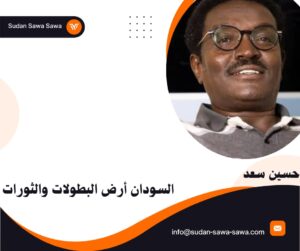
Sudan Sawa Sawa, April 10, 2025
By: Hussein Saad
When the Jasmine Revolution erupted in Tunisia, I wrote an analysis for our publication, “Ajars Al-Hurriya,” before it was closed by the National Congress Party in July 2011. The analysis was titled “From Tunisia to Sudan: The Cause is One and So is the Solution.” The Sudanese people, known for igniting revolutions and being a land of heroes, have preceded many countries in initiating popular uprisings.
Following Sudan’s independence in 1956, several revolutions occurred against oppressive military governments. The first was in 1964 against General Ibrahim Abboud, the second in 1985 against Marshal Jaafar Nimeiri, and the third in December 2019 against Marshal Omar al-Bashir. Each of these revolutions successfully overthrew the respective regimes. The Sudanese people are recognized as the first to launch a popular revolution in Africa and the Arab world.
Today, in April 2025, as we reflect on the prophetic year following the March-April 1985 revolution that led to Nimeiri’s downfall, and seven years since the sit-in at the General Command in April 2019 that ousted al-Bashir, we must draw lessons from our disappointments and setbacks. As Professor Ammar Al-Baqir noted in his articles titled “In Commemoration of the December Revolution,” the first setback came after the signing of the political agreement and constitutional document, which led to the establishment of the first transitional government. It is important to note that while this setback weakened the revolution, it did not extinguish it.
We will also conduct a deep analysis of the political class that has dominated the political scene. In my book, “The Dream of Revolution and the Challenges of Transition,” I dedicated a chapter to the unity of the Forces for Freedom and Change and its components. The challenges were numerous, and disagreements intensified day by day, leading to a significant fragmentation of these forces. Despite their initial resilience, they could not withstand the fierce winds of change.
Furthermore, we must consider the role of trade unions in the revolution and their share of disappointments and setbacks. The transitional government’s media shortcomings in supporting democratic transition and addressing errors contributed to escalating tribal conflicts, which became evident during the transitional period in regions like Darfur, Khartoum, South Kordofan, Kassala, Port Sudan, and Al-Jazeera.
The attempts to undermine the revolution have led to civilian casualties and displacement, as well as threats of famine and deteriorating economic, health, and living conditions. A widespread campaign of arrests has occurred, with some individuals dying in detention centers, alongside horrific reports of sexual violence documented by human rights organizations.
For the sake of public interest, we aim to draw comparisons and lessons from the March-April 1985 uprising. We will also revisit the insights of Professor Taj Al-Sir Osman in his piece titled “On Its Fortieth Anniversary: What Are the Lessons of the March-April 1985 Uprising?”
In Your Green Name, O October
On October 21, 1964, a popular revolution erupted against the regime of the late General Ibrahim Aboud, toppling his government. This was the first popular revolution in Africa and the Arab world. The revolution began at the University of Khartoum following the killing of student Ahmed Al-Quraishi, whose funeral sparked the uprising. Sudanese artists Mohamed Wardi and Mohamed Al-Amin sang in celebration of the October Revolution, which is still remembered with great appreciation and reverence by the Sudanese people.
In your green name, O October, the earth sings…
The fields have ignited with wheat, promises, and hopes.
The treasures exploded from the earth, calling…
In your name, the people triumphed.
The prison walls broke down…
And the chains fell like wedding braids in hands.
October has been in our nation since time immemorial…
It lived through silence and sorrows,
Resilient and victorious until the dawn appeared…
History ignited a fire and burned bright.
The people echoed the words of the late poet Hashim Siddiq:
When the tyrant’s night was long and the dawn of light transformed from our eyes…
We said we would revive the past.
The past of our ancestors who defeated the oppressor and demolished the citadels of tyranny.
And on a night when we were crowds battling the oppressive era, barriers ignited, obstacles burned.
A cry came from the street…
We swear we will not falter; the path of the revolution guides the free.
And the street rose…
The anger of the nation spread like fire, and all of us, O homeland, were crowds of revolutionaries.
The April and December Revolutions:
On April 6, 1985, the April Revolution broke out against the regime of Jaafar Nimeiri in the capital and the regions. This victorious revolution followed Nimeiri’s declaration of a state of emergency in the country amid rising prices for food and fuel.
In 2013, the September Uprising erupted following the removal of subsidies on consumer goods and fuel by the ousted Bashir government. In 2016, a strike by Sudanese doctors protested the government’s deliberate neglect of the health sector, followed by a sit-in in 2017.
In December 2018, after months of gasoline shortages and a severe currency crisis, the revolution lasted for four months until April 6, 2019. This marked the largest call for a sit-in in front of the General Command of the Armed Forces, demanding the overthrow of the ruling National Congress Party and the military regime of ousted Omar Hassan Ahmad Bashir. As a result, the president was removed, and a Transitional Military Council was announced on April 11, 2019.
The people were dissatisfied with the council’s president (Lieutenant General Awad Ibn Auf), who was associated with the previous regime. On April 12, 2019, he resigned from his position, and Lieutenant General Abdel Fattah al-Burhan was appointed. Despite this, the revolutionaries continued their sit-in until their demands were met, but the number of martyrs more than doubled. A massacre of betrayal occurred in the last days of Ramadan during negotiations between the revolutionary forces of the Declaration of Freedom and Change and the Military Council, until the constitutional document was agreed upon and signed on August 17, 2019.
“(Jahr) Stop the ongoing war against the bodies of women. Sudanese female journalists work with high professionalism in oppressive conditions and circumstances.”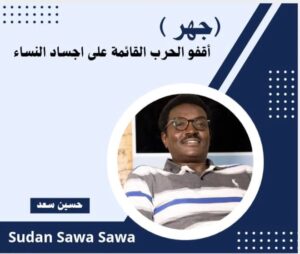
By: Hussein Saad
Sudan Sawa Sawa: March 9, 2025
Journalists for Human Rights (Jahr) emphasized the necessity of stopping the targeting of female journalists and journalists, halting the war, and ensuring accountability for crimes committed against them.
In a statement released to mark International Women’s Day, celebrated every year on March 8, Jahr stated: “With the escalation of armed conflict in Sudan between the two main parties (the Armed Forces) and (the Rapid Support Forces), along with allied groups and militias, women, particularly female journalists, have become direct targets of violence, persecution, and systematic targeting that includes murder, torture, enforced disappearance, and sexual violence in this catastrophic war. Both parties have abandoned the rules of international humanitarian law and their international responsibilities in dealing with civilians and civilian objects. They have neglected their duties to protect the safety of civilians, especially female journalists and other civilian groups, including healthcare providers and humanitarian relief workers—all of whom are members of the civil society that should be protected under international humanitarian law.”
Jahr described International Women’s Day as a cherished occasion for Sudanese women and female journalists, as well as for women around the world. This year’s celebration comes under the slogan “Rights, Equality, and Empowerment for All Women and Girls for a Fairer and More Equitable Future for Everyone. ” This slogan aims to call for “accelerating measures that will open the door to equality in rights, power, and opportunities for all, and a future where no woman is left behind.”
This year, International Women’s Day arrives as the world faces new and interconnected crises, witnessing a frightening decline and erosion of rights. Our country, Sudan, continues to suffer under the weight of a devastating war that erupted in the capital on the morning of Saturday, April 15, 2023, spreading across the entire nation. This conflict continues to wreak havoc on the bodies of Sudanese women, forcing them into displacement from their childhood homes, neighborhoods, and workplaces. This horrific and oppressive war has truly become a “war against the bodies of women,” with women and girls subjected to horrific killings and systemic violence.
The weapons of rape, kidnapping, enforced disappearance, and enslavement of women and girls have become lethal tools used systematically in this catastrophic war, degrading the dignity of women. Thousands of women have been forced to leave their homes, facing displacement and the fragmentation of families due to the systematic targeting of women. They struggle to find safe havens in displacement areas within the country and seek refuge in neighboring Arab and African countries in search of physical, psychological, and familial safety amidst severe economic, social, and cultural difficulties.
In this hostile environment for women, Sudanese female journalists continue their courageous struggle and fight, fulfilling their professional duties with great responsibility, high professionalism, and commitment under incredibly harsh conditions that make it almost impossible to work. The war has compelled dozens of them into forced and involuntary displacement to relatively safer areas within the country or to flee to the unknown, seeking asylum or legal residency across borders.
Many female journalists remain trapped in the heart of danger, facing an uncertain and bleak fate in the midst of war. As the conflict persists, they confront challenges related to survival, lack of medicine, and difficulties in fulfilling their professional mission to uncover the truth amid the ruins of homes destroyed by indiscriminate aerial bombardments and the roar of artillery and drones.
The Sudanese journalist community and civil society are urged to unite, consolidate efforts, and harness energy and enthusiasm to build a broad coalition against war, hate speech, and discrimination, advocating for peace, freedom, and justice. This coalition should work independently to stop the war and commit clearly to the principle of accountability for both warring parties and all entities involved in human rights violations in Sudan. There must be a firm assurance that they will not escape punishment for committing war crimes, crimes against humanity, and acts of genocide—crimes that are not subject to statute of limitations and should not be forgotten or subjected to political compromises that overlook the pursuit of justice, fairness, and reparations for the victims of armed conflict in Sudan.
It is noteworthy that this year’s celebration coincides with the thirtieth anniversary of the Beijing Declaration and Platform for Action, issued in 1995. This important historical document pertains to women’s rights worldwide, particularly the right to legal protection, access to services, the engagement of youth, and the transformation of social norms, stereotypes, and outdated ideas.
“Sudanese Women on Their Day: War Must Stop and Justice Achieved”
By: Hussein Saad
Sudan Sawa Sawa, March 9, 2025
On Saturday, March 8, the world celebrated International Women’s Day, honoring the struggles, courage, and contributions of women. This day recognizes their relentless fight for social justice and a dignified life for everyone. In the towns and villages of Sudan, this significant occasion comes at a time when our country is deeply scarred by the ongoing war since April 15 between the armed forces and the Rapid Support Forces. Sudanese women have paid a heavy price for this catastrophic war, experiencing violence, sexual assault, murder, and forced displacement, particularly in regions like Darfur, Khartoum, Al-Jazeera, and Senja
The repercussions of this conflict have led to a complete absence of healthcare and education services, widespread unemployment, poverty, and the proliferation of weapons, coupled with a severe lack of security. Millions of women are treated as second-class citizens, stripped of their rights and subjected to various forms of blatant discrimination that shame humanity. They do not receive wages sufficient to sustain their livelihoods or support their families, nor do they earn equal pay to men.
The state has failed to fulfill its responsibilities towards children, neglecting to provide daycare and kindergartens, which further burdens women. They are often forced into domestic servitude and face sexual violence due to the wars and rampant domestic abuse. Additionally, laws have been enacted that undermine women’s status and strip them of the right to choose their lifestyle, profession, partner, and the freedom to move and reside as they wish.
Numerous laws against women, such as the Public Order and Personal Status laws, have stripped mothers of custody rights and led to the widespread practice of child marriage. These issues have created a complex web of challenges for Sudanese women, turning their lives into a living hell. According to reports from international organizations, there are over 10 million displaced persons due to the war, of whom around 90% are women and children. More than 5 million women and girls are at risk of sexual violence, and alarming reports indicate the existence of markets for the sale of women in Sudan.
In the marches and demonstrations of the glorious December Revolution, Sudanese women were at the forefront. However, when the revolutionary government was formed, they were marginalized and excluded from decision-making positions in the transitional government despite their noble contributions and sacrifices. Although they were promised a 40% representation quota to meet the aspirations of Sudanese women, that promise was not fulfilled, and the actual representation was far less than promised. This reflects a failure to meet the expectations of Sudanese women and recognize their vital role in society and the political process.
We believe that the way to escape this nightmare is to stop the war and achieve justice and equity. This requires equal opportunities for men and women and moving away from the current governance approach based on tribal quotas and favoritism. There must be a comprehensive change in the methodology of peace agreements, which have only led to more wars and the spread of hate speech and racism, replacing equal citizenship and social justice.
Whenever there is a movement towards peace, as seen in previous periods, women are simultaneously excluded from participating in the political processes aimed at stopping the war and achieving peace. Occasionally, we see token participation from some women. One of the many lessons learned from peace-building experiences in Sudan and the protection of women is that our country has a long history of impunity. The failure to hold perpetrators of atrocities accountable is not only a barrier to transitional justice but also perpetuates the cycle of violence. Many horrific human rights violations that occurred in Darfur years ago are now being repeated in Khartoum, Al-Jazeera, Senja, and other areas.
The complete lack of justice reflects the failure of the Sudanese state and the international community, sending a message to victims that they do not deserve justice and that perpetrators can continue their actions without fear of consequences. On International Women’s Day, we affirm that there is no freedom for society without the liberation of women. There is no meaning to any standards of humanity, civilization, or progress without achieving complete equality for women and ensuring they enjoy all economic, political, and social rights equally. We must end all laws that affect women’s status, essence, and human dignity.
In light of the current war in Sudan, we call on the international community to prioritize the issue of women during these ongoing and future negotiations, ensuring they receive full protection. The parties to the conflict should not consider women as legitimate battlefields from which they can escape accountability, as has been the case historically.
In addition to promoting equality and implementing United Nations Security Council resolutions, such as Resolution 1325 on Women, Peace, and Security, which calls for increasing women’s participation in all conflict prevention and resolution efforts, it is crucial to effectively incorporate women’s issues into peace talks and transitional negotiations. We must ensure their representation reflects their reality and contributions to society.
Women in Sudan are not merely victims; they are also leaders and key drivers of change and peace. They must be considered partners in building a peaceful future for Sudan. It is essential to remember that achieving peace and stability in Sudan will not be possible without addressing the root problems faced by women and ensuring their rights are fully upheld.
The time has come to change the narrative and focus efforts on building a future that guarantees women the status they deserve in leadership and in laying the foundations for a new Sudan. In conclusion, we extend our heartfelt congratulations and best wishes to women around the world and especially in Sudan on the occasion of their International Day. We echo the words of the people’s poet, Mahgoub Sharif: “Good morning, bright evening… O homemaker and office lady, open to the public… Blessed is your effort, O mother of labor, stamped with toil… Rise early, prepare the shirt and scarf… You have memorized the anthem and the verse… I love the scent of the earth and the breeze.”
“Key Features of Behaviors Associated with Intolerance”
Written by: Atif Mohamed Ahmed
Interested in Studying Humanities
Sudan Sawa Sawa, March 6, 2025
1. Verbal Changes within Group Boundaries: This leads to individuals expressing less or demonstrating intolerance. People may refrain from being honest in their creativity due to fear of harm. Those experiencing certain modern forms of intolerance often react negatively in front of friends and close ones or, at times, even in front of their group members.
2. Avoidance: This involves taking steps to avoid interaction with influential group members whom one dislikes, regardless of the reasons. In this case, the intolerant individual does not express direct hatred towards the group but completely withdraws from any interaction with its members, ensuring adherence to avoidance.
3. Discrimination: This behavior marks the onset of a discriminatory mindset, where the intolerant individual deprives members of creative groups of access to facilities and privileges that others enjoy. This is often enforced through laws that are explicitly supported by authorities in certain societies, as is currently the case in Sudan.
4. Violence and Physical Aggression: Intense animosity among creative individuals can escalate to levels of violence and physical aggression against group members driven by hatred.
5. Genocide: This stage represents the extreme hostility and hatred among groups, involving acts of genocide or other forms of mass violence without any justification.
“People’s Movement Led by ‘Al-Hilu’ Comments on Kadugli incidents”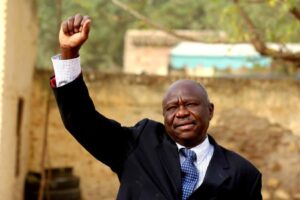
Kadugli: Sudan Sawa Sawa, February 4, 2025
The Sudan People’s Liberation Movement – North (SPLM-N) issued a statement regarding recent incidents in Kadugli, announcing that the “People’s Army” has repelled an attack by the “Port Sudan militia” targeting its positions.
In the early hours of Monday, February 3, 2025, the Port Sudan militia, which refers to itself as the “Sudanese Armed Forces,” bombarded areas under the control of the SPLM-N and attempted to advance to seize these territories.
Aggressive movements began on January 30, 2025, when they deployed a mobile force to the “Kuwik” area and established a presence in Jabal “Hajar al-Mak” within Kadugli. On February 1, 2025, they started shelling SPLM-controlled areas in Kiga, Saraf al-Dai, Tilo, al-Dashoul, and Hajar al-Mak, subsequently forcing citizens to evacuate from neighborhoods in Kadugli to Hajar al-Mak, placing them in the line of fire.
The SPLM’s forces confronted the attacking force, inflicting significant losses in a populated area. The movement of the army was observed as citizens attempted to advance towards SPLM-controlled regions.
The actions of the “Port Sudan militias” are an extension of the ongoing assaults they have conducted since the bombing of the city of “Yabus” in the New Funj region on December 19, 2024, which resulted in the deaths of three World Food Programme staff members. This was followed by attacks on several areas in the Nuba Mountains region aimed at expelling humanitarian organizations and halting the delivery of aid to those in need.
Similar movements have been noted from the city of Daleng, but the SPLM-N is monitoring all these activities and is fully prepared to respond to any attack or aggression targeting its controlled areas.
“A Call to the Army: You are Being Led to a Televised Hell, and the “Brave” are Nothing but Murderous Terrorists”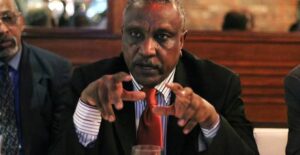
Sudan Sawa Sawa, February 1, 2025
Author: Yasir Arman
I feel a deep sorrow for the people, particularly the civilians, who are preoccupied with the trivialities of disengagement while ignoring the murderers and the so-called “Brave Battalions,” who terrorize the innocent. These groups attack unarmed civilians, killing hundreds and broadcasting their crimes on social media, marking an unprecedented escalation of war crimes in Sudan.
The leaders of the Islamists, along with figures like Osama Abdullah and his relatives—filled with hatred for the December Revolution—believe they can eradicate any trace of resistance from the people’s hearts and erase the memory of the revolution. They fail to understand that the revolution will endure as long as the people remain, as it represents the people’s path to a dignified life. The faith in it is unwavering, akin to faith in God.
The Islamists have a mutually beneficial relationship with the upper echelons of the military leadership, based on a pact of power and wealth accumulation devoid of principles or any mention of God or the homeland. This is an unlicensed agreement, not formally authorized.
The Islamists are eager to ride on the army’s back, seeing it as the umbilical cord to power. Yet, they also fear the army and have attempted to protect themselves by creating multiple competing armies and militias. Their relationship with the army is ambiguous; we witnessed this closely during the transitional period in Naivasha and after the December Revolution. They have a media chorus ready to attack the army’s leadership whenever they feel threatened.
It is in their interest that the army remains in complete opposition to its own people. What frightens them most is the prospect of the army aligning with the people or the December Revolution in particular. The army has paid a heavy price during the era of the National Salvation, facing divisions and displacements like all state institutions that have been hijacked. At no point has the army been free from the Islamists’ attempts to convert it into a military wing. Today, they surround it with battalions of crime and terrorism in a fragile alliance, reminiscent of fractures witnessed at various historical junctures.
The army is suffering from both longstanding and emerging structural issues that affect its national composition. The makeup of the officers does not reflect that of the soldiers and fails to represent Sudan’s diversity. This imbalance has worsened due to prolonged engagements in rural wars. Previously, Southerners accounted for 21% of its ranks, and their departure led to an increase in this imbalance. Darfur contributed 34% to its composition, while the Nuba Mountains accounted for 13%. Many from these regions have left the army due to the rural conflicts and neglect of lower-ranked personnel. The army’s integrity was further distorted during the “salvation” period, which embraced politicization and the proliferation of multiple armies and militias. This era witnessed the emergence of new militias, the latest being the Kessala Brigade, formed abroad.
The army and security institutions have consumed 80% of the national budget, leaving little for education, health, or services. Rural areas and the middle class have been devastated, resulting in a rise in poverty and marginalization, as well as increasing unemployment among youth, many of whom have turned to armed struggle. The late Jalha Rahmat Al-Mahdi astutely summarized this situation: “We are a burden; no passport, no ID, we push the state beyond its limits. The dead are martyrs and the living benefit.” A state that neglects its rural areas and youth is unsustainable.
The military doctrine of the army does not rest on the principle that sovereignty belongs to the people, nor does it view the army’s mission as defending the authority of the people and the sovereignty of the nation. Instead, it is built on opposing democratic civilian governance. The Islamic movement has no interest in a professional army or its reconstruction; it fears a strong, professional army loyal to the nation and does not fear God, instead requiring an army loyal to its organization and group.
Drying up the resistance is impossible, and the televised killings of innocents by the Ba’ath battalions strike at the very fabric of society, exacerbating ethnic and geographic grievances, tearing apart the bonds of national unity, and undermining the institutions of the state, particularly the armed forces.
The day after the army regained control of Wad Madani, I wrote an article titled “Are Army Leaders on the Brink of Turning the Victory in Wad Madani into a Defeat? Are Islamists Again Trying to Push the Army Toward The Hague?” The Islamic movement, led by individuals wanted by the International Criminal Court, does not want the army’s leadership to seek solutions outside the path of destruction it has outlined. They wish to lead them to the path of criminal accountability, mistakenly believing that the international community will reconcile with them as it did with some groups classified as terrorist organizations, as seen in Syria. Here, the Islamists fail to recognize the geopolitical differences and the distinction between Damascus and Khartoum regarding international interests.
The armed forces have an opportunity to seek genuine peace and national recovery, which can not be achieved by opposing the December Revolution. The revolution is deeper and more firmly rooted than the war and greater than the terror of the Ba’ath. It is crucial to note that this Ba’ath is not the companion Al-Barrah ibn Malik, but Osama Abdullah! The Islamic movement has pushed the armed forces toward a coup, failed in that coup, and then sought war, destroying both society and the state. The people understand that a civilian transitional period was a better option than a coup or war. Once society and the state return, the anger of the people will be directed at the Islamists, and they will be held accountable despite the lies, the noise, and the weapons. Those who doubt this should ask Omar al-Bashir and his associates how they ended up imprisoned instead of remaining in power.
The widespread and horrific crimes committed by both sides of the conflict have taken on a systematic and organized form, with a Daesh-like ideology behind the Ba’ath battalions. Sudanese Islamists who share this extremist ideology should ask themselves: Where is Daesh itself?
It is our duty to undertake extensive and organized efforts both domestically and abroad to monitor, document, and collaborate with national, regional, and international organizations to declare the Islamic movement and its military wing, the Ba’ath battalions, as a terrorist group. Army leaders must recognize that the army is a state institution and should be sensitive to the televised crimes that can not be overlooked and that exacerbate national divisions. This complicates the possibility of building the armed forces according to a new, agreed-upon national program, raising ethnic and geographic questions about the national character of the armed forces—questions that are both old and renewed, deepened by the wounds of this war.
What is happening will not go unchallenged regionally or internationally, and it is in the armed forces’ interest to separate their existence from that of the Islamists, even gradually. We understand the difficulties of this path, and the army leadership must acknowledge the crimes and punish the perpetrators.
The armed movements allied with the armed forces, despite our profound disagreements with their directions, must stand against the crimes and terrorism of the Ba’ath battalions, which are driven by an ethnic agenda and oppose the December Revolution. These movements will also face repercussions one day. It was a commendable action by the Sudan Liberation Movement led by Mini Minawi to condemn some of these crimes publicly.
Finally, we in the civil forces must move beyond the issue of parallel governance and disconnection. The disconnection has already occurred, and we should reconnect with our people, our nation, and the Sudanese Revolution from 1924 to December 2019.
“The Political Dimension of Transitional Justice”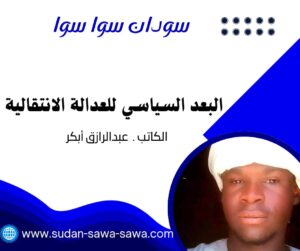
Sudan Sawa Sawa, January 29, 2025
Author: Abdulrazaq Abaker
Transitional justice is one of the fundamental human values that thinkers throughout successive eras have adopted as legal frameworks to reform oppressive regimes and hold them accountable for the crimes they have committed. It serves as a key element in the governance of nations, followed by secondary values such as democracy, liberalism, and federalism. Consequently, transitional justice assumes a significant political dimension as it addresses transitional periods in countries that have experienced conflicts or severe human rights violations.
Transitional justice must aim to build democracy, which in turn reinforces democratic principles through political reforms and the strengthening of state institutions to be transparent, robust, and respectful of human rights. It should ensure the rights of citizenship and their practical application. Additionally, it seeks to achieve national reconciliation, fostering dialogue and understanding among various political and social groups, and working to redress harm and hold accountable those responsible for wartime violations and crimes against humanity, which include displacement, murder, genocide, and other offenses.
Those responsible must be held accountable before superior constitutional courts, whether international, regional, or local, to cleanse what remains of injustice and violations and to prevent their recurrence. Regarding the rule of law, establishing fair and effective judicial systems to address violations is crucial. All policies and procedures must be based on legal foundations, followed by a fair distribution of wealth that achieves social justice and reduces economic disparities. Sustainable development policies should also be promoted to support marginalized groups.
To achieve this justice, institutional reform is essential for restructuring security and the judiciary, ensuring that such violations do not recur and promote professionalism and integrity within government institutions. Therefore, the world has embraced this form of justice as an alternative solution or a key to stabilizing the remaining human values by addressing the root causes of conflict and building citizens’ trust in the state and its institutions.
In summary, transitional justice is not merely a legal or social issue; it must also play a political role as a better solution to eliminate the blemishes from other aspects aimed at rebuilding the state and communities on foundations of justice, fairness, and equality. To achieve these goals, strong political will and commitment from all stakeholders are necessary.
“Drowning in Emptiness”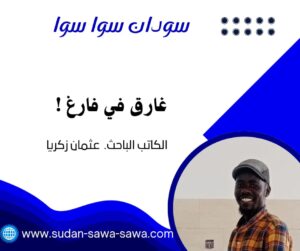
Sudan Sawa Sawa, January 29, 2025
Author/Researcher: Osman Zakaria
I am drowning in an empty cup,
Cutting half the distance to you.
The night invades me,
Shattering me with scars of memories
That ignites the pages of time.
And I wonder,
What is the secret of my love for you,
When I am the one who always writes you
With the ink of the soul and the pulse of the heart?
You are my identity, the secrets of existence,
Coming from an enchanted planet.
You laugh while the knife twists
On the map of your body.
We are drowning in an empty cup,
Bleeding a history between the pillars of Darfur
And South Kordofan and the Blue Nile.
Our identity is images that cry tears,
It is the issue of your fertile lands
And your abundant resources.
I am Sudanese in my love,
Land of sultans, civilizations, and dynasties.
You will never rest.
You will return sweeter, you will return more precious.
I will boast of you before creation on the Day of Judgment.
I long for you as I hold you close,
So how can I, in my solitude, whisper your name,
Love you?
I live in you, and I exist for you, and with you,
O homeland whose name is me,
And all that remains for me is a rebellious letter.
“Nairobi Surveys: Sudan Sawa Sawa – January 24, 2025”
Share Your Opinion:
Sudan: We have informed South Sudan about the presence of Southern mercenaries within the ranks of the militias, yet no action has been taken. We will respond appropriately to the numerous violations against Juba at both the international and regional levels.
What do you think about the future of relations between the two countries?
Email: info@sudan-sawa-sawa.com
Phone: +254710226030
“Continued Use of Chemical Weapons by the Sudanese Armed Forces”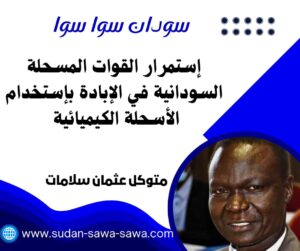
Nairobi: Sudan Sawa Sawa, January 23, 2025
By: Mutawakil Osman Salamat
In our previous article, we highlighted the delusions affecting the leader of the racist terrorist factions due to the leaked news of potential sanctions being imposed by the United States. Sanctions have indeed been imposed on General Abdel Fattah Abdelrahman Burhan, the commander of the Sudanese Armed Forces, as well as on Ahmad Abdullah, a Sudanese-Ukrainian official in the defense industries system and an arms supplier to the Sudanese military, and the company Protex Limited. We also warned our followers about another very serious leak regarding the use of chemical weapons by the Sudanese Armed Forces in their conflict with the Rapid Support Forces (RSF). Due to the gravity of this issue, we promised to dedicate a separate article to it.
In this article, we will explore the nature of this news and seek to understand “what chemical weapons are,” how the armed forces obtained these internationally banned weapons, and whether the use of chemical weapons by the Sudanese Armed Forces in their war against the RSF is the first occurrence. Have these chemical weapons been used in other wars and different areas of Sudan? Has Sudan signed and ratified the Chemical Weapons Convention? What procedures are followed if a member state fails to comply with the terms of the agreement? How can these weapons be disposed of, especially considering the likelihood of the de facto government denying their existence? Additionally, is there a significant risk of their use in densely populated areas of Khartoum?
The nature of this topic comes from an article published in The New York Times by Declan Walsh and Julian E. Barnes, which states that four senior American officials reported that the Sudanese army, under the command of General Abdel Fattah Abdelrahman Burhan, used chemical weapons on at least two occasions against the Rapid Support Forces. Furthermore, these weapons have recently been deployed in remote areas of Sudan, and there are concerns about their potential use in densely populated areas of the capital, Khartoum.
So, what are chemical weapons according to international law?
Article 2 of the Chemical Weapons Convention defines “chemical weapons” as follows, whether together or individually:
1. Toxic chemicals and their precursors, except for those intended for purposes not prohibited under this Convention, provided that the types and quantities are in accordance with such purposes.
2. Munitions and devices specifically designed to cause death or other harm through the toxic properties of the toxic chemicals specified in subparagraph (a) that are released as a result of the use of such munitions and devices.
3. Any equipment specifically designed for use directly in connection with the use of such munitions and devices specified in subparagraph (b).
The same article defines “toxic chemical” as any chemical that, through its chemical action on life processes, can cause death, temporary incapacitation, or permanent harm to humans or animals. This includes all such chemicals regardless of their origin or method of production, and regardless of whether they are produced in munitions facilities or elsewhere.
Some reports indicate that the Sudanese army and allied militias are acquiring armaments from several countries in Europe, Asia, and some North African nations. China, Russia, and Iran have played significant roles in supplying military equipment to the Sudanese government. Sudan’s armament capabilities have developed following the establishment of the Yarmouk Military Industrial Complex, which could have been a source of pride for every Sudanese. However, its goal has been to manufacture and develop weapons and ammunition for the extermination of Sudanese populations in the south, the Funj region, the Nuba Mountains, Darfur, and the east. Reports have emerged of Iranian, Iraqi, Turkish, and other foreign experts working to produce internationally prohibited weapons, specifically chemical weapons, aimed at deterring Sudanese revolutionary movements and exterminating various ethnic groups with Islamic and Arab state ideologies that demand freedom, justice, and equality. These weapons are also reportedly smuggled to Palestinian groups to deter Israel and other Arab states suspected of collaborating with it.
Since that time, the Yarmouk Complex has transformed into a facility for producing chemical weapons. There is also the Giad Complex, with half of its operations now focused on military industries. Other sites have been mentioned as engaging in similar activities but have remained unnoticed since Israel targeted the Yarmouk Complex, such as Karbala, Al-Qadisiyyah, and Guri, along with several other hidden locations in the desert. Numerous national and multinational companies are involved with these sites, both internally and externally.
The Sudanese government has not adhered to international humanitarian law or the Chemical Weapons Convention in its war against its citizens in the regions of the Fung and Nuba Mountains. During the first war from 1984 to 2005, and the second war from 2011 to the present, the government used internationally banned weapons against civilians in these regions. It employed anti-personnel and anti-tank landmines, which were seized by the Sudan People’s Liberation Army after defeating the Sudanese Armed Forces in the city of “Heiban” in June 2011 and in the battle of “Troj” in February 2012. This was confirmed by the Small Arms Survey in May 2012.
The government air force also used cluster bombs against civilians in the Nuba Mountains area of “Troj” on February 29, 2012. The same organization documented the use of incendiary bombs by the government air force when an Antonov aircraft dropped incendiary bombs on civilians in the “Jaw” area, controlled by the Sudan People’s Liberation Movement – North, on March 6, 2012, with testimonies from two victims.
The Sudanese government went further by using chemical and toxic weapons in the city of “Talodi” in 2012, following reports of poisoning cases that resulted in deaths due to inhalation of suffocating gases released by the Sudanese Armed Forces. This serious crime was confirmed by medical professionals who treated many victims in that area, noting that the injuries indicated the nature of these weapons. They reported that the symptoms observed in the affected individuals were likely caused by organophosphate poisoning. This was reiterated by an editor of Nuba Report on October 10, 2016, who stated that some victims who were hospitalized indicated that the government air force had dropped bombs emitting gray smoke that quickly turned white.
The Sudan People’s Liberation Movement – North has called on the regional and international community to protect civilians and take measures to prevent the Sudanese government from using chemical weapons and other internationally banned arms, but to no avail.
Eight years ago, in January 2017, Amnesty International published a report confirming the use of chemical weapons by Sudan in Jebel Marra, Darfur, one year prior to the report’s release. This occurred during a nine-month-long extensive assault by the Sudanese Armed Forces on the region, with most victims being civilians. The organization obtained compelling evidence of the Sudanese government’s war crimes in the area, which included indiscriminate bombing of civilians, extrajudicial killings, abduction and rape of women, looting and burning of villages, and forced displacement. These evidences were evaluated by chemical weapons experts Keith Ward and Jennifer Nack. The organization called for accountability for the perpetrators, but the member states of the Chemical Weapons Convention failed to act for weak and illogical reasons.
The use of chemical weapons by the Sudanese army and its militias in their conflict with the Rapid Support Forces is not the first instance; rather, it is a common practice in their ongoing wars against the Sudanese people in New Funj, Darfur, and the Nuba Mountains, as well as against Sudanese armed resistance movements such as the Sudan People’s Liberation Army – North and the Sudan Liberation Army. This occurs amidst the silence of the marginalized local community and the regional and international community.
The use of these chemical weapons has had detrimental effects on human health in those areas, leading to deaths, the emergence of skin diseases, eye problems, respiratory illnesses, fetal deformities, and the charred remains of victims, as well as amputations. There are also negative impacts on animals and the environment, including water and air pollution, the death of domestic and wild animals, the flight of many species, fish die-offs, soil degradation, and destruction of crops. These are just a few examples, and some of these effects may persist in the long term.
It is well-known that the armed forces and the de facto government in Port Sudan, as well as its predecessors, have not adhered to agreements and commitments, and they do not even respect their semi-constitutional documents and distorted laws. Despite Sudan’s membership in the Organization for the Prohibition of Chemical Weapons (OPCW), marked by its signing and ratification of the agreement, the country enacted the “Chemical Weapons Prohibition Act of 2004.” This act explicitly prohibits the manufacture, use, production, possession, transfer, or licensing of chemical weapons, as well as the import or export of materials containing specific chemicals, the development or production or storage or use of specified chemicals, and the establishment of chemical facilities. However, reports from the “New York Times” about the army’s use of chemical weapons are alarming, especially given the history of this army and its militias. The army lacks professionalism, and its combat doctrine is based on religion, ethnicity, and jihad for the sake of God. In this abnormal situation, the likelihood of non-compliance with this agreement and its national law is certainly a concern.
Given these circumstances, which indicate the military government’s disregard for international treaties and the imposition of sanctions, it is noted that many Sudanese people and victims of human rights violations have begun to doubt the effectiveness of these sanctions and Washington’s ability to enforce them. They also question the capability of Washington and its allies in international institutions to take bold steps regarding this serious violation of the Chemical Weapons Convention in light of the ongoing collisions of interests in Sudan and international conflicts. Nevertheless, they still hold out hope that these two countries will positively contribute and stand by them alongside the international community during this critical phase.
The United States or any member state of the OPCW must fulfill their ethical duty and humanitarian role in achieving peace and democratic transformation in Sudan and maintaining regional and international security. They should urgently request clarification from the armed forces regarding the possession and use of these dangerous and internationally banned chemical weapons. If the armed forces deny possessing or using these weapons, they must devise a clear and rigorous plan to destroy these chemical weapons, ensuring the safety of Sudanese citizens. In the event of an admission of possession, the organization should impose strict sanctions and pressure the armed forces to provide a detailed plan for the destruction of these chemical weapons according to the procedures outlined in the international Chemical Weapons Convention.
#Protecting Sudanese Citizens from Chemical Weapons
#Imposing Deterrent Sanctions on the Sudanese Army and Its Militias
#Ending Wars by Addressing Their Historical Causes
#Achieving Peace by Tackling the Roots of the Sudanese Problem
“Between Life and Death”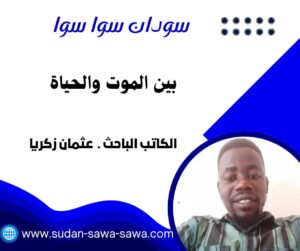
Sudan: Sudan Sawa Sawa, January 22, 2025
Author/Researcher: Osman Zakaria
Do not publish my dreams as if they were a slogan,
All slogans have rusted.
Our dreams have turned to dust.
I once believed my dreams were hope,
I lament my African identity or the foolish ones.
My present has fled for refuge!
What about my future?
The cities are filled with the miserable,
Everyone there feels like a stranger.
Many live like the dead,
While few are truly alive.
The living feel death,
And the dead feel life.
Oh, the duality of existence!
How it revels in the destruction of hopes.
The world has fallen silent,
In the face of the atrocities committed
Against a people who yearned for life on their land.
Let history write what it wishes;
The glow of wishing has faded.
The sun is no longer a sun,
And dreams have lost their goodness.
Write, oh history, and bear witness that
The tears of the sky have been tainted
By the pragmatism of annihilation.
“Thoughts and Sayings”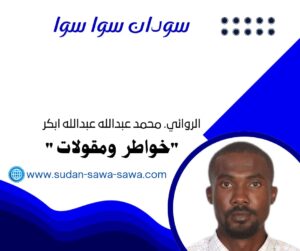
Sudan Sawa Sawa January 18, 2025
Novelist: Mohammed Abduallah Abduallah Abakar
-1-
“They left their homeland, migrating to foreign lands to improve their economic conditions. Their lives are caught between the hell of exile and the homeland. Despite this, society shows them no mercy, viewing them through a materialistic lens, as if they are mere pumps for money. Their requests are endless, and in the process, their lives and dreams have been lost in exile. Their memories have faded, leaving the expatriate trapped between the fires of their homeland and the fires of exile.”
-2-
“The worst year in my life, marked by bloodshed and the slaughter of the people’s sons by the generals. It was heavy with sorrow and pain as we lost our loved ones. Wars brought smoke, destruction, death, scattered body parts, genocide, displacement, and refugees without return. The cries of women, the elderly, and children echoed due to hunger, cold, and thirst. We hope this year marks a true beginning for a new year, where the Sudanese people can turn the pages of sorrow and pain, moving towards new chapters filled with joy and hope, closing the chapters of wars, gunpowder smoke, and the fires ignited by the generals. With the declaration of a new Sudan, we will celebrate the birth of a new nation.”
3. “Social media has become a sacred aspect of life, presenting frightening phenomena that cast shadows over society, undermining social bonds. These platforms are immersed in scenes, images, videos, and live broadcasts, where users share stories and sad tales of fictional heroes. There’s nudity, daily routines that have turned into calls for corruption, showcasing women’s bodies with their genitalia exposed, covered only by small pieces of sheer fabric. Others exploit Quranic verses and prophetic sayings, swearing by God to gather likes and comments in exchange for money. Some profit from the tragedies of the poor and sick, acting as intermediaries for charitable work by targeting expatriates. Even the streets are not spared; they are found at bus stops, spraying a mixture of water and poor-quality cleaners on car windows, followed by wiping them with a worn-out rag—all to gain financial rewards disguised as gifts. Behind the facade of poverty, these individuals knock on the doors of pity through these platforms to gain new views that enrich their bank accounts and attract new contributors, victims of deceit, and fraud. Their digital methods have created a safe haven that alleviates the shame and embarrassment faced by those who engage in real begging.”
4. “Countries will not rise as long as there are narcissistic and opportunistic elites who violate everything in a struggle to monopolize power, dominate, exclude, and submit to failure. They will never rise as long as countries are run by painkillers that lead to tyranny, dependency, and corruption.”
5. “The brutality of Libyan militia prisons includes killing, torture with electric wires, severe beatings with whips, and the use of sticks for psychological and physical humiliation, to the point of causing bodily disabilities. This torture is aimed at extorting a financial ransom; only then are you released. If you do not pay, you will suffer until you meet your maker in the heavens.”
6. “I have held the cow’s udder for years, milking it as much as I wanted until God took her. However, she left her daughter an orphan. When the daughter grew up, her grandfather told her the entire history of her mother and said: ‘These are thieves; do not submit to them.’ Many nations have liberated themselves from these thieves. Therefore, Macron, do not raise your nose; without Africa, France would not exist. You should thank Africans. This is in response to Macron’s statement: ‘If it weren’t for Africans, France would be German today.'”
7. “After all the hypocrisy and flattery, you want to be a ruler, but do not dance on the skulls of the dead.”
8. “A mother remains a mother despite all difficulties and challenges. In times of hardship, you find her steadfast, embracing her children with a will that instills in them the spirit of life and hope. Everyone marvels at the source of that strength, which emanates from her small heart, hidden behind her ribs—a heart that leaves everyone puzzled by its secret. It embodies tenderness and determination. She is the most important person in my life, a testament to years of sacrifice and forgiveness. She taught me what faith is, through sacrifice, struggle, and true love. I would not be alive without my mother. You are my source of strength, and I am truly proud of you, Mom; you are the heartbeat of my life.”
9. “The African person is socially oppressed, having had their mind washed by educational curricula and media, leading to self-hatred. Therefore, you find the African person is not forgiving of themselves, carrying a historical grievance against others.”
10. “Comrade Wadd Al-Nuba is a creative and revolutionary artist who conveyed a true message to his Sudanese people through revolutionary art. He had a clear vision against domination, injustice, and oppression. This represents a form of art that ignited the fire of rebellion, supporting his country’s issues through his artistic work, managing to address many problems through his revolutionary art.”
11. “The comrade and fighter believes in the principles and goals of change. He stands in defiance against all who have spread corruption on this earth. He struggles tirelessly against the wall of despair, seeking a path for the poor and the needy to follow so they can free themselves from the whims of the reckless. O comrade, you carry all burdens and sorrows, facing every calamity and hardship. Resist all challenges and pressures. Do not break, do not be defeated, do not surrender, do not collapse. Be strong, steadfast, and resilient like a towering mountain, and do not be like those who sell everything, even their own selves, without any compensation.”
“Civil Democratic Forces Coordination “Taqaddum” Holds Armed Forces and Allied Troops Responsible for Atrocities”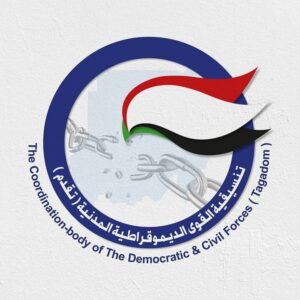
Sudan Sawa Sawa, January 16, 2025
The state of Al-Jazeera has been shocked by horrific crimes against civilians following the takeover of the city of Wad Madani and other areas in the state by the armed forces and their allied troops. Disturbing video recordings have surfaced, depicting brutal atrocities that include field executions, beheadings, disembowelments, targeted racial violence, and the burning of residential areas.
This is not the first instance of such atrocities; similar incidents occurred in the areas of Halfaya and the state of Senner after the armed forces gained control there, under the pretext of punishing “collaborators.” This vague term encompasses regional, tribal, and political classifications, as defined by the perpetrators of these crimes. These practices are a testament to the rising terrorist activity of the National Congress Party/Islamic Movement, manifested through their militias and elements within the security and military apparatus. Their aim is to advance a divisive agenda in the country, eliminate dissenters, and instill fear in the hearts of the people in preparation for their iron-fisted control over the nation through a war they have ignited in pursuit of power over the corpses of the people.
We hold the armed forces and their allied troops responsible for these horrific crimes and call for an independent and transparent investigation to identify the violators and pave the way for accountability for the atrocities they have committed. We also urge all supporters of the glorious December Revolution to unite their voices against the National Congress Party/Islamic Movement and their terrorist agenda, and to confront the rising rhetoric of hatred and racism that is being amplified through the media war drums.
Secretary-General
January 16, 2025
#YesToPeace #NoToWar #StopTheWar #PeaceForSudan #ProtectCivilians
In the name of Allah the most compassionate the most merciful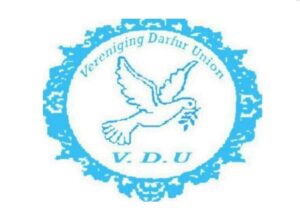
Sudan Sawa Sawa January 16, 2025
“Darfur Community Union in the Netherlands”
Statement of Condemnation:
To the honorable sons and daughters of the Sudanese people both at home and abroad, to local, regional, and international organizations working in the field of human rights, and to nations and peoples that cherish peace and justice:
We have been following with great concern the ongoing senseless war between the armed forces and the Rapid Support Forces in Sudan, which has resulted in the largest man-made humanitarian disaster in our world today! This cursed war exposes the involvement of innocent civilians in central Sudan, specifically the residents of the Kanabi area in the Gezira region, as parties to a conflict in which they have no connection whatsoever. This clearly reveals the mentality behind the organized campaigns of genocide against specific social groups.
The Darfur Community Union in the Netherlands strongly condemns the repeated inhumane violations faced by defenseless civilians in Sudan overall, particularly in Darfur.
Our people are facing heinous crimes against humanity, including genocide and ethnic cleansing perpetrated by the Rapid Support Forces and their affiliates through widespread acts of forced displacement, sexual assaults, and mass killings. Areas such as Kutum, Saraf Omra, Kolbos, Zalingei, and others in Darfur have witnessed these horrific crimes. In the Kanabi area of Gezira, citizens have faced severe violations, including public executions, being thrown into the Nile from bridges, and being shot in the streets. These egregious acts are committed by the Sudanese army and the so-called “Brigades of Innocence,” under the guise of cooperating with the Rapid Support Forces or the so-called “Law of Strange Faces.”
The Catastrophic Humanitarian Situation:
Our people in Sudan, particularly in Darfur, are enduring extraordinarily harsh humanitarian conditions that defy description. Women and children are dying from hunger, while those who remain live in constant fear of an uncertain fate. Survivors are seeking safe refuge amid a lack of security and food, creating an unprecedented humanitarian disaster that calls for urgent intervention from humanitarian organizations to save the victims.
The Darfur Community Union demands the following:
1. End the Indiscriminate Bombing:
We call on both parties in the conflict to cease the indiscriminate bombing of cities and displaced persons’ camps using heavy artillery and aircraft. We also demand that the war be kept away from residential areas and that civilians not be used as human shields.
2. Lift the Siege:
We urge the Rapid Support Forces to stop the siege of cities and states, allowing the delivery of essential supplies and necessary materials for life.
3. Provide Humanitarian Assistance:
We appeal to the international community, the United Nations, humanitarian organizations, the African Union, and local and regional organizations to take responsibility for delivering humanitarian aid to save those affected throughout Sudan.
4. Accountability for Crimes:
We call upon the judicial and human rights authorities to issue arrest warrants against those responsible for crimes against humanity and genocide. All individuals involved in these crimes must be held accountable and brought to justice immediately.
5. Immediate Cessation of War:
We demand that the warring parties cease hostilities immediately and work towards achieving comprehensive peace. What our people are experiencing in Darfur, and Sudan in general, is a humanitarian disaster that threatens life and existence. It is essential to unite efforts to save lives, achieve justice, and ensure a dignified and safe future for the affected.
In conclusion:
We beseech the Almighty God to improve the situation in Sudan, to bring security and peace to all corners of the country, to spare our people the horrors of war and calamities, and to relieve their suffering, granting them a dignified and safe life. Justice for all the people of Sudan. The blood of the victims will not be shed in vain. Sudan is a homeland for all.
Darfur Community Union in the Netherlands
January 16, 2025
“Sudan Sawa Sawa, January 16, 2024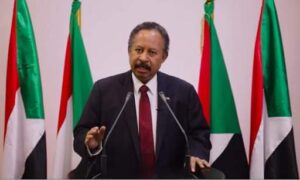
Dr. Abdullah Hamdok
Former Prime Minister
The ongoing violations and massacres in the Al-Jazeera State are horrifying. Our people have been subjected to these atrocities for over three decades. The world must take responsibility for protecting civilians from these terrorist groups that commit the most heinous massacres against our people.
I appeal to all honorable sons and daughters of Sudan not to succumb to campaigns of racial mobilization and hate speech, and to resist the incitement against various social groups that seek to create further discord among Sudanese people.
We urge all advocates of peace worldwide to work towards bringing the warring parties to an immediate halt to this devastating war.
“From the Stations of War Trade”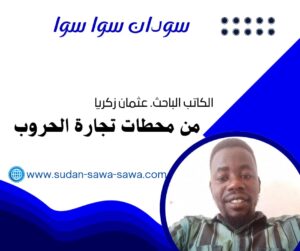
Sudan Sawa Sawa, January 16, 2025
Author: Researcher Osman Zakaria
Throughout Sudan’s history, the price of wars and destruction has always been paid by the marginalized, the oppressed, the poor, and the wretched. Similarly, the costs of ignorance, backwardness, human exploitation, and fatal religious extremism fall on the marginalized and the uninformed, who become victims of abhorrent sectarian religious mobilization. Meanwhile, indifferent stakeholders and politicians sit behind their tables, exchanging small talk and toasting to their deals, just as they do today in their lavish palaces, while they kill citizens and their children in purges that primarily target individuals based on ethnicity, color, and narrow affiliations aimed at erasing their identities. This has occurred in many regions of Sudan, such as Darfur, South Kordofan, and Blue Nile, where they continue to perpetrate the same horrific practices against local populations.
What is happening to the citizens of the Kanabi area in the “Wad Madani” region follows the same pattern, as they are coldly killed through systematic purges conducted by sectarian militias using the most severe forms of torture, while no one does anything to stop this dirty war. In times of war, madness can prevail, and genius may emerge.
Why don’t some decide to amend the rules of the war trade game?
This might be a revenge against the dominance of certain empty assumptions and the simplicity of those calling for subjecting unscientific fundamentals to the authority of reason. The war trade revolves around a primary objective: protecting historical privileges, even at the cost of the majority of the Sudanese people.
What the Sudanese people propose is to replace the destructive game of war trade with a game of free democracy that respects every individual’s life, granting them the right to live with dignity and obligating leaders to move toward a fair and dignified homeland where everyone is equal, without discrimination based on ethnicity, color, gender, or narrow affiliations.
“I do not belong to a generation that hears tales about my ideal city.”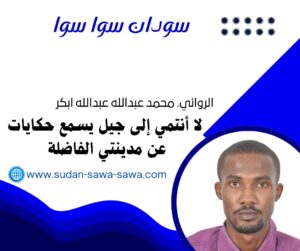
Sudan Sawa Sawa January 14, 2025
By the novelist: Mohamed Abduallah Abduallah Abaker
“I do not belong to a generation that hears tales of my ideal city, nor do I have the stories of past centuries about the beauty of its streets, alleys, and signs of civilization. My generation opened its eyes to the city during a time of wars, chaos, destruction, and devastation. They did not leave a landmark without attempting to demolish it. They destroyed every trace of beauty they could reach, leading the city to its current state of ruin, devastation, and disorder at the hands of generals. Signs of chaos are found everywhere: in distorted buildings, crumbling streets, and areas overshadowed by misery, poverty, and deprivation. Upon entering these areas, the city’s entrances reveal the extent of destruction, neglect, and decay that has befallen it.
It seems that what is happening to the city is a result of a political class that has seized power and harbors a deep-seated resentment towards everything historical and civilized in this city. Perhaps they do not feel a sense of belonging to this civilization. They have stripped the city of its spirit, transforming it into a grotesque entity that no longer belongs to the realm of civilization and progress. All that remains are the poems and songs we sing about it, despite the systematic and intentional destruction aimed at eradicating the signs of life in the city.
All the afflicted cities that have lost their joy to wars and conflicts wake up to the sounds of shells and aircraft that violate their sanctity. Cities where war has become a daily activity—a reality that must be adapted to. In these cities, one can suddenly become a displaced person, a refugee, or a homeless individual on the streets, while loved ones, who once provided shelter, have become mere fragments. In cities where children no longer know the taste of play, they have become stateless.
Our lives are filled with wars, devastation, famine, and a disregard for human life, tearing apart freedom and suffocating breaths in a crippled homeland. Your rights are stripped away, and your dignity is insulted, leaving you uncertain about where to go. You become a displaced, expelled individual without a homeland, while hunger, relentless and unforgiving, etches its mark on the bellies of the people.”
“The Danger of Violence in Schools”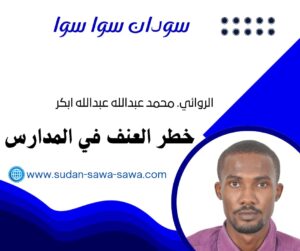
Sudan Sawa Sawa, January 11, 2025
Author: Mohamad Abduallah Abduallah Abaker
School violence is one of the most serious phenomena that has begun to spread and escalate in all communities. It manifests in various forms, primarily verbal, physical, and symbolic. These are pathological behaviors that, in turn, impact all aspects of cognition, psychology, and social interaction.
School violence did not emerge from a vacuum; it is driven by a range of pathological social factors, including methods of socialization, media content that encourages violent behavior, and the influence of drugs. Violence refers to aggressive verbal and non-verbal behavior directed toward another person. It encompasses physical violence, psychological harm, threats, theft of others’ possessions, and chaos and disorder within the school environment.
Causes of School Violence:
Family:
The role of the family has diminished due to both parents working and relying on external care, as well as family breakdown resulting from divorce. Additionally, families often fail to meet the needs of their children due to their low economic status.
Society:
Poverty and deprivation are prevalent, and the roots of a patriarchal society remain dominant. For instance, the use of violence by a father or teacher is often considered acceptable and aligns with social norms. According to social psychology theory, individuals tend to exhibit violent behavior when they are part of a society that views violence as an allowable and accepted behavior.
There is a traditional perspective that glorifies successful students while belittling those who struggle academically. This demeaning comparison fosters violent behavior. The social climate is characterized by a lack of social justice, unclear visions for the future, and the absence of effective social policies in marginalized areas, as well as ineffective planning.
The lack of organized policies for leisure activities and the absence of alternative recreational opportunities, along with weak social guidance and support systems, coupled with the economic status of some impoverished families, makes students feel inadequate and deprived in comparison to their peers. This can lead to feelings of hatred and resentment towards those who are better off, resulting in unusual behaviors that may drive them to engage in violent practices.
Culture:
The youth’s disinterest in cultural and youth centers, as well as children’s clubs, is due to the absence of rich programming and modern facilities. Additionally, the promotion of violence in certain dramatic works, recreational games, and political dialogues contributes to this detachment.
School:
There is a lack of cultural and sports activities, as well as insufficient diverse activities that cater to various hobbies and interests. The weakness of curricula and educational content, which do not keep pace with the rapid developments in modern information and communication technology, leads to the continued use of outdated teaching methods. These traditional approaches have a negative impact on the upbringing of this generation, contributing to unethical behaviors characterized by violence.
Dependence on Lectures and Lack of Dynamics
Some subjects rely heavily on lectures, leading students to become disruptive. The assessment methods currently in use favor testing over behavioral modification, neglecting to address students’ weaknesses and focusing excessively on criticism. There is a lack of interactive classes and an overload of explanatory sessions, resulting in an imbalance between education and upbringing. The loss of educational role models has contributed to the rise of private tutoring, which has diminished the teacher’s authority, making them a mere tool in the hands of students and parents. This has negatively impacted the teacher’s image in the eyes of students and led to the collapse of their role as a model. Additionally, there is a lack of fieldwork in the study of violence, which should be based on statistical data and surveys that define specific temporal and spatial research locations.
Reducing School Violence:
To combat school violence, it is essential to promote a culture of tolerance and reject violence. This includes fostering listening and communication skills among students and between teachers and students, starting from a young age.
Organizing meetings with parents can help clarify dialogue methods and give children the space to express their opinions, ensuring they are listened to. There is a need to restructure cultural and sports activities, incorporating incentives to discover and encourage talents. Social prevention should focus on improving the harsh social conditions faced by communities vulnerable to violence and delinquency while instilling a culture of success in life and educating on communication skills.
Reviewing the School Discipline System
The school discipline system should be revised to become a preventive behavioral modification system rather than a punitive one. This includes increasing listening sessions, enhancing students’ self-confidence, raising awareness of their positive attributes, and incorporating educational psychology classes for teachers. Activating the role of parents and relevant community associations is essential, as well as taking care of institutional projects and prioritizing certain institutions.
The role of social counselors should be emphasized by identifying students with recurring aggressive behavior so that we can address them and understand the reasons behind their actions. Intensifying social guidance sessions and preventive awareness through school magazines and wall posters is necessary to sensitize students and protect them from tendencies toward violence.
Strengthening preventive measures in schools can be achieved by implementing a daily supervision program to monitor student attendance and punctuality while also avoiding empty periods or irregular schedules. Cases of violence within the institution should be documented, followed, and studied by the educational community, including the parents’ council, social counselor, school doctor, and support staff.
Facilitating communication between educational institutions, families, and teachers is crucial, along with activating listening and social guidance cells. Preventing violence involves addressing behavioral deviations that students may exhibit, such as drinking alcohol, smoking, or experiencing psychological stress.
Both families and educational institutions must fulfill their roles in socialization to avoid the underlying causes of these issues.
“A Grievance Against You, My Country“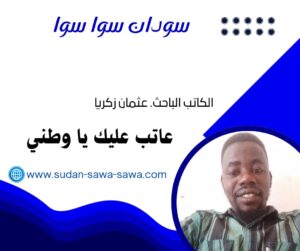
Sudan Sawa Sawa, January 9, 2025
By the Researcher: Osman Zakaria
I hold a grievance against you, my country,
For I love you, yet you do not protect me!
In my childhood, my dream was to buy new shoes and pants, but you never fulfilled my desires; you never gave me anything!
You did not provide me with a seat in your universities, forcing me to migrate in search of knowledge, while the host country took away a part of my life, my love, and my longing.
Throughout my life, you subjected me to those who humiliated me and those who silenced me.
When I came of age, you left me vulnerable to war, seeking refuge in chance, with no one else to protect me. You prevented me from pouring my thoughts into writings that could benefit others.
I hold a grievance against you, my country, so do not disown my blood!
I grieve over your shortsightedness as you abolished breastfeeding from mothers and replaced mother’s milk with cow’s milk, causing bulls to become our brothers in nursing, and we inherited their stubbornness, adding to the stubbornness of nature!
I hold a grievance against you, my country, because you no longer treat your children equally in love, pushing some to seek affection to compensate for emotional deprivation. I lament the language of Arabic that has replaced emotions with storms throughout my life.
I grieve, but I do not seek an apology that may not arrive before my time runs out!
Today, my life bids farewell to what I once thought was my lifetime; today I discovered that we were not granted lifetimes in you, but rather temporary residencies in a corrupt era.
“The Absence of Reading in Society“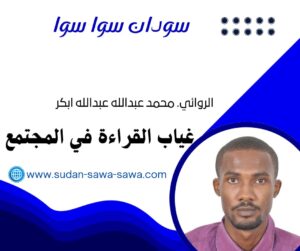
Sudan Sawa Sawa, January 9, 2025
By Novelist: Mohamed Abdullah Abdullah Abakar
“When we say that reading is the key to the mind, a pathway to the maturation of ideas, and a means to elevate oneself to stand out among others, it is unfortunately absent from our communities. This absence is largely due to educational systems filled with gaps and far removed from analytical and critical approaches, as well as encouragement for reading. For instance, most students graduate with little more than what they studied in their textbooks and university courses.
The abundance of distractions available to youth—such as the internet, movies, and games—along with the overwhelming influence of social media, which bombards them with temptations and diversions, consumes their time entirely. You often see young people glued to their screens, whether in front of televisions, watching videos, or tuning into satellite channels, wasting all their time on films, programs, and series. This phenomenon has even extended to trains, subways, and bus stops, where everyone is engrossed in their smart devices instead of reading books.
Moreover, the rising prices of books pose a challenge, especially since many young people are facing financial crises. There is also a lack of incentives, rewards, and competitions centered around reading, understanding, and summarizing books. As a result, the culture of reading remains absent in our societies.”
“Why This Contradiction?“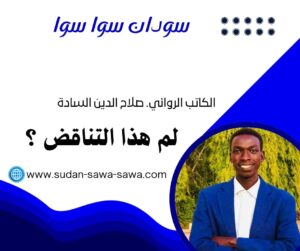
Sudan Sawa Sawa, January 8, 2025
Author: Salah El-Din Al-Sada
In life, there is much joy, but there is also a great deal of pain. We have many friends, yet we often feel lonely. We have numerous family members, but very little genuine communication and connection. There is an abundance of love, but also an overwhelming amount of betrayal and emotional manipulation. There are few sincere expressions of affection, while concealed hatred abounds. We have countless certificates, yet little awareness and insight. There are many platforms for peace, yet wars continue to devastate countries. Numerous preachers exist, but very few demonstrate true commitment and integrity. There are many mosques, but very few true believers and devout individuals. We have plenty of fertile agricultural land, yet we face famine and severe poverty. There are abundant resources and opportunities, but very few creative and invested minds. There are many doctors, yet people still die from malaria and cholera.
Many opportunities exist, but people remain unemployed and consume without contributing. There are many wealthy individuals, yet they are unhappy and unable to enjoy their wealth due to chronic illnesses that plague them. We are all disengaged, yet we pretend to be busy. There are many books, but few readers, and those who do read often reflect on only a fraction of the material.
In this life, some people are joyful and indulge in life’s pleasures, while others are afflicted and lay on the ground in sorrow and despair, hungry and thirsty. Is this what is called fate? Or is there a betrayal of trust in enjoying the rights of others? I do not know where this contradiction arises! Are we inconsistent with our reality? Or is our reality inconsistent with us? Is this contradiction in our favor? Or does it beautify our lives? Why don’t we strive to improve ourselves and aspire to higher salaries? Why are we so superficial that we pretend to be good while harboring so much pain within? Why do we greet each other in mosques yet clash on the streets? Why do we seek to please distant individuals while ignoring those who are very close to us? Why are we so superficial that we deceive each other in our relationships, considering it cleverness and wit? Wouldn’t it be better if we were honest from the very beginning?
Why do girls use makeup to attract us, the careless ones, who haven’t even treated our faces to a bit of Vaseline except in the harsh winter? Were you not beautiful until after using it? Or do you have a complex of inferiority and objection towards God? One last question: Why do we kill each other while aspiring to enter heaven? Is not Satan more honorable than us because he did not commit the sin of taking a life?
However, we must be honest with ourselves and with those we love so that there is balance between our priorities and secondary matters, between what is important and what is more important. We need to dedicate time to the precious things in our lives—our duties, our mothers, fathers, children, wives, husbands, neighbors, work, education, loved ones, sisters, brothers, friends, feelings, and everything beautiful in our lives. According to my humble analysis, neglecting any of these elements that represent the essence of our lives is what amplifies the contradictions within us.
In conclusion, the trap we find ourselves in can not be escaped without uprooting the poison, causing the disease from its roots. At this point, I would like to quote a part of a statement by Jay Shetty that he mentioned in one of his articles: “We can not solve problems with the same mindset that created them.”
Introduction
In times of change and uncertainty, statements from leaders, organizations, and communities serve as powerful tools to shape public discourse and influence decision-making. In Sudan, statements have played a pivotal role in reflecting aspirations, addressing grievances, and charting a course for the future. “Statements” captures these vital messages, offering a platform for diverse voices that contribute to the country’s evolving story.
Official Statements
From government leaders to international organizations, official statements provide critical insights into policies, intentions, and responses to unfolding events. These declarations often outline frameworks for action, offer reassurance during crises, or convey diplomatic stances.
By archiving and analyzing these statements, the platform helps audiences understand the positions of key stakeholders, enabling a clearer view of Sudan’s political and social landscape.
Civil Society and Grassroots Movements
Statements from civil society groups and grassroots movements offer an authentic glimpse into the concerns and demands of Sudan’s people. These voices often highlight issues overlooked by mainstream narratives, bringing attention to social justice, human rights, and environmental challenges.
Amplifying these statements not only ensures representation but also fosters a sense of collective agency, empowering communities to push for meaningful change.
International Solidarity
Sudan’s journey toward stability and progress has garnered global attention, with statements from foreign governments, NGOs, and advocacy groups reflecting international solidarity. These messages often express support, call for accountability, or offer resources to address humanitarian crises.
Highlighting such statements underscores Sudan’s interconnectedness with the global community and emphasizes the importance of sustained international engagement.
Statements of Reflection and Hope
Beyond politics and advocacy, some statements carry messages of reflection, hope, and resilience. These often come from cultural leaders, religious figures, or ordinary citizens sharing their experiences and visions for a better future.
These statements serve as reminders of the strength and perseverance of Sudan’s people, inspiring others to remain hopeful despite challenges.
Interactive Engagement
“Statements” encourages audience interaction, allowing readers to engage with the content through polls, discussions, or submissions of their own statements. This participatory approach fosters a sense of inclusion and ensures that the platform remains a dynamic space for dialogue.
Conclusion
“Statements” provides a curated space for the voices shaping Sudan’s narrative, offering insights into the country’s complexities and aspirations. By showcasing diverse perspectives, the platform bridges divides and promotes understanding among local and international audiences.
In a time of transformation, the power of words cannot be underestimated. Through “Statements,” Sudan’s story is not only told but also enriched by the voices that define its path forward.
